You are using an outdated browser. Please upgrade your browser or activate Google Chrome Frame to improve your experience.

39 Austrian German Phrases and Slang for Speaking Like a Local
Austrians have their own German phrases and slang for a wide range of situations, from saying hello and goodbye to drinking off a hangover.
And while you can certainly get by in Austria with basic German words , nothing makes an Austrian happier than a foreigner making an effort to understand the local language.
In this post, we’ll give you tons of Austrian slang and phrases , with equivalents provided in both standard German and English.
Austrian German Phrases and Slang
Greetings and goodbyes, culinary phrases, common austrian slang, are german and austrian two different languages, resources to improve your austrian german, listen to austrian music, watch austrian tv and videos, look for opportunities to practice, and one more thing....
Download: This blog post is available as a convenient and portable PDF that you can take anywhere. Click here to get a copy. (Download)
A German travel phrasebook is a helpful tool on your trip to Austria—most times, but not always!
Let’s take a look at some of the differences between German and Austrian:
Before 10 a.m., we usually say Guten Morgen —the same as in Germany. This can be shortened to Morgen and will often be pronounced as Moagn .
For the rest of the day, we use Grüss Gott , which translates into “greet God.” The German Guten Tag and Guten Abend aren’t too common. In an informal context, you can always say Hallo , Servus or Grüss dich.
The formal version of goodbye is Auf Wiedersehen or Auf Wiederschauen . Among friends and family, it’s common to use Tschüss and Pfiat di.
Austria’s gastronomic vocabulary is endless. Whereas a Gasthaus serves mostly local and traditional foods, such as Fritattensuppe and Wienerschnitzel , a Restaurant is a bit more elegant and offers a broader variety of food.
You can also enjoy Jause and some beers at a Gastgarten , the Austrian form of the German Biergarten . One major difference to Germany is the way Austrians order their beer. Eine Halbe Bier , or in dialect A Hoibe , stands for “half a liter of beer” and is equivalent to the German Grosses Bier .
Try to say: I hätt gern a Hoibe, bitte! (I’d like a large beer, please!).
A small beer is called a Seidel or Seiterl . Reperaturseidl is a funny Austrian word, describing a small beer consumed after a long night out to prevent hangovers.
Austrian desserts such as Topfenstrudel mit Schlagobers or Palatschinken are world-famous and sometimes even replace lunch. You should try them together with a Viennese Häferlkaffee .
As far as cultural experiences go, they don’t come more authentic than an excursion to an Austrian Almhütte where you can enjoy some traditional foods such as Kaiserschmarrn , Kasnocken or G’röste Knödel mit Ei . The Almhütte is a great place to relax after a long hike.
Austrians would say Ein Ort zum Ausrasten (A place to Ausrasten .) Be careful! Whereas ausrasten means relax or recharge for Austrians, Germans would translate it to “getting mad.”
Here are some more expressions that are uniquely Austrian:
The renowned Austrian writer and journalist Karl Kraus used to say:
Was die Deutschen und Österreicher trennt ist ihre gemeinsame Sprache. What distinguishes the Germans from the Austrians is their common language.
Germany and Austria share the same language, but with fundamental differences in the way they use it.
The Austrian Hochdeutsch (“high” German) used in writing and formal contexts is fairly similar to the German Hochdeutsch , however, there are huge differences in the way German is spoken in everyday life .
The so-called Mundart (vernacular) is strong and exists in many different forms, varying from region to region. Many words are used exclusively in spoken Austrian and therefore there’s no set way to spell them.
If you’re an advanced German speaker, you may even notice that the spirit of the Austrian language is different: Germans are very direct and straight to the point, while Austrians tend to sound a bit more vague and ambiguous.
Austrian German is also bit more ironic, which occasionally leads to small misunderstandings–Germans sometimes accuse Austrians of being inappropriate and Austrians criticize their neighbors’ lack of humor.
For starters, check out the basics of German as they’ll turn out very helpful for your Austrian studies.
Let’s move on to some tips of how to fine-tune your ear to the Austrian dialect:
Search for Austrian music on YouTube, look up the lyrics and soon you’ll be singing along with Austropop stars like Rainhard Fendrich or STS .
You can also check out Austrian radio channels. Most of them speak very clear Austrian German without too much dialect. The most popular ones are Hitradio Ö3 and Kronehit .
Is there a better way to train your listening skills than by watching a movie or a TV show ? You might want to put on the subtitles, especially with content that can be tricky to understand.
Here are my video content recommendations for you:
- Ulrich Seidl’s “Paradise” trilogy (which consists of the movies “Paradise: Love” , “Paradise: Faith” and “Paradise: Hope” ) portrays the story of those marginalized by Austrian society in a frighteningly realistic way. It’s a typical example of Austrian cinema in terms of pushing boundaries and criticizing social issues in a way that Hollywood wouldn’t dare to do.
- If you’re interested in the history of the Austrian monarchy, check out the “Sissi” collection . These movies are old but gold, and tell the story of the Austrian empress Sissi , who became a cult figure after being assassinated in 1898.
- “Kommissar Rex” is one of Austria’s favorite TV shows and tells the story of a cop who teams up with a German Shepherd to solve crimes around Vienna.
- For more advanced speakers, watching an Austrian stand-up comedian such as Alfred Dorfer is a great way to get a feeling for “real Austrian.” In order to fully understand stand-up comics, you’ll need some background knowledge of Austrian politics and social issues.
FluentU takes authentic videos—like music videos, movie trailers, news and inspiring talks—and turns them into personalized language learning lessons.
You can try FluentU for free for 2 weeks. Check out the website or download the iOS app or Android app.
P.S. Click here to take advantage of our current sale! (Expires at the end of this month.)

Try FluentU for FREE!
It features authentic video clips from both Austria and Germany, all with interactive subtitles that unpack the meaning of each word. You’ll pick up colloquial German, with slang and modern buzzwords included.
Once in Austria, make sure you don’t miss out on any opportunities to practice speaking. Every conversation will help you polish your pronunciation and take a step closer to fluency, so don’t be shy!
Consider staying with locals using platforms such as Airbnb or Couchsurfing . If you plan on staying longer, you can check out some Austrian language immersion programs .
If you’re not currently lucky enough to be exploring Austria, you can find a language exchange partner online ! Search for Austrian locals on HelloTalk or MyLanguageExchange.com .
Learning any new language takes patience and dedication, but if you practice on a daily basis (and start planning that Austrian vacation), it won’t be long until you sound like a local!
Want to know the key to learning German effectively?
It's using the right content and tools, like FluentU has to offer ! Browse hundreds of videos, take endless quizzes and master the German language faster than you've ever imagine!

Watching a fun video, but having trouble understanding it? FluentU brings native videos within reach with interactive subtitles.

You can tap on any word to look it up instantly. Every definition has examples that have been written to help you understand how the word is used. If you see an interesting word you don't know, you can add it to a vocabulary list.

And FluentU isn't just for watching videos. It's a complete platform for learning. It's designed to effectively teach you all the vocabulary from any video. Swipe left or right to see more examples of the word you're on.

The best part is that FluentU keeps track of the vocabulary that you're learning, and gives you extra practice with difficult words. It'll even remind you when it’s time to review what you’ve learned.
Start using the FluentU website on your computer or tablet or, better yet, download the FluentU app from the iTunes or Google Play store. Click here to take advantage of our current sale! (Expires at the end of this month.)
Enter your e-mail address to get your free PDF!
We hate SPAM and promise to keep your email address safe

English-German Phrasebook for Tourists: Going to Austria
The official language in Austria is considered to be German. Despite this, the locals dislike Germans and are wary of pure German pronunciation. The immediate Austrian dialect is very different from the usual German phrasebook pronunciation.
Before traveling to Austria, you can, of course, buy a English-German phrasebook, but the pronunciation language in the regions of Austria is quite different. For example, in Carinthia there is a Slovenian dialect, and in Bungerland - Hungarian and Hradisch-Croatian. Austrians also know English quite well, as it is taught in every school as a second language.
When traveling to Austria, you will definitely need a German phrasebook.The most popular and useful phrases in German are as follows:

- Call Us: 1-800-969-6853
- E-mail Us: [email protected]
- Need Help Deciding?
Travel Guide
Love to travel explore our austria travel guide, a handy traveler's companion.
- About Austria
- Austrian German words and phrases
- Climate of Austria
- Things to do, places to visit in Austria
- Safety Tips in Austria
- Nice to know information about Austria
View Other Destinations
Traveling to Austria ? We can help you! Book an Interpreter Now
Austria Travel Guide: Useful German Words and Phrases.
For those who love to travel and have wanderlust in their souls, visiting a new place or country can be a rewarding a fulfilling experience. One of the best things you can do to prepare for your trip is to learn a new language. This way, you not only make it easier on yourself to communicate with the locals, but you’ll gain a better appreciation of the culture, traditions and history of another country.
Learning to speak a new language is a great way to immerse yourself in the country’s culture and provide you with a better insight to its people. Most travelers can get by using a phrase book, which can be quite helpful if you need to simply get around, order lunch or ask for directions. However, if you are planning to stay longer, such as if you need to study or want to do business in a new city, or if you wish to relocate to a new country with a different language, it pays to learn the language before you leave for your trip.
There are many benefits to learning the language by enrolling in a language class rather than simply learning from a book, so you can learn the proper pronunciation, stress and correct grammatical use and conjugation of each word. For more technical matters, such as the translation of some legal documents, it’s best to get a professional language translation done. You want to go with a language translation service that is accurate, reliable and fast.
For those traveling to Austria and other German speaking nations, we have prepared a useful and handy travel guide for your convenience. Our country travel guide such as the Austria travel guide is divided into convenient sections, such as a country overview, followed by what you can see and do as you tour Austria, as well as a section providing some basic German words and phrases to help you get around. This way, you can haggle for better prices as you shop or you can ask for help when you need it. There is also a section provided listing several practical travel safety tips when you travel to Austria.
Austrian Useful Words and Phrases (Useful German Words and Phrases)
Here are some everyday Austrian useful words and phrases in German that you will find useful when you travel to Austria.
Basic Phrases
Good evening Good night Good bye Yes No Thank you. Thank you very much. You’re welcome. Please. Excuse me. I’m sorry. I don’t understand. I don’t speak German. I don’t speak German very well. My German isn’t very good. Do you speak English? Speak slowly, please. Could you please speak more slowly? Repeat, please. What’s your name? How are you? Is the tip included? How much does that cost? Is there a public phone here? Can I go on the Internet? Can you help me? Where is the bathroom? What time is it?
Guten Abend Gute Nacht Auf Wiedersehen Ja Nien Danke Danke schön Bitte schön Bitte Entschuldigung Sie bitte Es tut mir leid Ich verstehe Sie nicht Ich weiss nicht Deutsch sprechen Ich spreche kein Deutsch. Ich weiss nicht Deutsch sprechen sehr gut Mein Deutsch ist nicht sehr gut Sprechen Sie Englisch? Sprechen Sie langsam bitte. Können Sie bitte etwas langsamer sprechen? Wiederholen sie bitte Wie heissen sie? Wie geht es Ihnen Is die Spitze aufgenommen? Wie viel kostet das? Gibt es ein offensliches Telefon hier? Kann ich im Internet? Konnen Sie mir helfen? Wo ist die toilette? Wie spat ist es?
Austrian Useful Words and Phrases – Asking for Directions
Where? Excuse me, where is …? Where are the taxis? Where is the exit? Is it near? Is it far? Go straight ahead. Go that way. Go back. Turn right. Turn right. Take me to this address, please. What is the fare? Stop here, please.
Voh? Enstchuldigung, wo ist…? Wo sind die Taxis? Wo ist der Ausgang? Ist es in der Nahe? Ist es weit? Fahren Sie geradeaus. Hehen auf diese Weise. Zuruckgehen Biegen Sie rechts ab. Biegen Sie links ab Nimm mich an diese Adresse bitte. Was kostet die Fahrt? Stoppen Sie bitte hier.
Austria Useful Words and Phrases – Basic Greetings
Hello! Good morning! Good afternoon. Good day! Good evening! How are you? Fine. Very well. So-so. What’s your name? I am Mr. … I am Mrs. / Miss … It’s nice to meet you. Goodbye. Goodnight. Where do you live? I live in the United States. This is my husband. This is my wife. This is my friend. This is my boyfriend. This is my girlfriend. Please visit me. I had a wonderful time. Help
Hallo Guten Morgen Guten Tag Guten Tag Guten Abend Wie geht es Ihnen? Geldstrafe. Sehr gut. So so Was ist dein name? Ich bin Herr… Ich bin Fraulein… Es ist schon, Sie kennen zu lemen. Auf Wiedersehen Gute Nacht Wo wohnst du? Ich leve in den Vereinigten Staaten Das ist mein Mann. Das ist meine Frau. Das ist mein Freund. Das ist mein Freund. Das ist meine Freundin. Bitte besuchen Sie mich. Ich hatte eine wundervolle zeit. Hilfe
Austrian Useful Words and Phrases – When Shopping
How much does that cost? At what time does the store open? At what time does the store close? What would you like? Can I help you? I would like this. Here it is. Is that all? I’d like to pay in cash. I’d like to pay by credit card. Can I order this online? women’s clothes men’s clothes blouse, skirt, dress pants, shirts, ties shoes and socks jeans bookstore bakery market grocery store
Wie viel kostet das? Wann fahrt der filiale zu eroffnen? Was zeit ist das geschaft zu schliessen? Was mochten sie? Kann ich lhnen helfen? Ich mochte dieses. Hier ist es. Ist das alles? Ich wurde gerne in bar bezahlen. Ich mochte mit kreditkarte bezahlen. Kann ich diese online? frauenkleidung mannerkleidung bluse, rock, kleid hosen, hemden, krawatten schuhe und socken jeans buchhandlung backerei markt lebensmittelgeschaft
Austrian Useful Words and Phrases – When Dining Out
Where is a good restaurant? A table for two, please. The menu, please. The English menu please. The wine list, please. I would like something to drink. Do you have a vegetarian dish? A glass of water, please. A cup of tea, please. A coffee with milk. That’s all. The check, please. Is the tip included? Enjoy the meal! To your health! It’s delicious! I like my steak rare. I like my steak medium. I like my steak well done. Another, please. More, please. Pass the… please. spicy sweet sour appetizers main course desserts salt pepper sugar soup salad bread butter noodles rice cheese vegetables chicken pork beef juice ice cream beer a bottle of wine ice cubes drinks cake tart food
Wo ist ein gutes restaurant? Einen tisch fur zwei bitte? Das menu bitte Den Englisch menu bitte. Die weinkarte finden Ich mochte etwas zy trinken. Haben sie ein vegetarishches gericht? Ein glas wasser bitte? Eine tasse tee bitte? Einen kaffee mit milch. Das ist alles. Zahlen bitte! Ist die spitze enthalten? Geniessen sie die mahlzeit! Fur lhre gesundheit! Es ist kostlich! Ich mag mein steak selten. Ich mag mein steak medium. Ich mag men steak well done. Anderen bitte. Mehr bitte Passieren die… bitte wurzig suss sauer vorspeisen hauptgerichte nachspeisen salz pfeffer zucker suppe salat brot butter nudeln reis kase gemuse huhn schwein rind saft eis bier eine flasche wein eiswurfel getranke kuchen torte lebensmittel
If you need document translation for any reason, don’t hesitate to email your documents to us at [email protected]
World Interpreting, Inc. is a professional language translation and interpreting company. Our company’s goal is to provide high quality translations in just about every language. Every work we deliver is done with a high level of passion and professionalism. We are known for providing excellent customer service to all our clients, regardless of the size or volume of the translation project. We are a corporate member of the American Translators Association (ATA). This means that clients can rely on us to deliver professional translation services each and every time and with every document we translate. World Interpreting, Inc. offers a fast and easy way to get your documents translated correctly and efficiently. At the same time, we ensure that the documents remain confidential and we guarantee the accuracy of our work.
“Important Notice – You may use or download information available on our travel guide pages for your own personal, non-commercial use, provided that give proper attribution, with a link back to our website. Similar to the sources used for the travel guides, World Interpreting provides links to information and a number of contents we believe constitutes a ‘fair use’ of any such copyrighted material. If you wish to use copyrighted material from this site for purposes of your own that go beyond ‘fair use’, you must obtain permission from the copyright owner. More information here .”
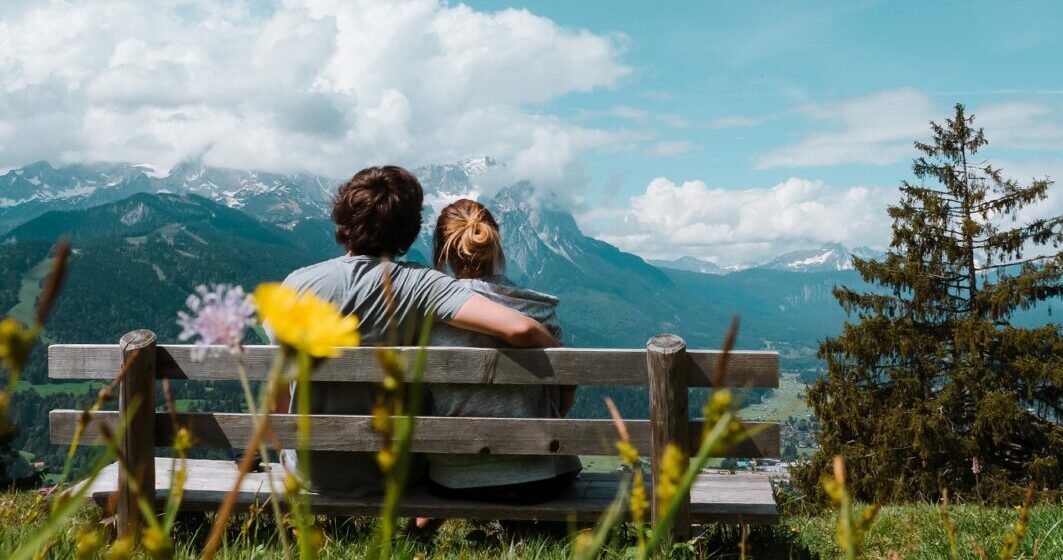
Austrian greetings: Tradition, slang, and ways to say goodbye
by Sandra Köktas
Published on July 18, 2022 / Updated on January 5, 2024
Why learn Austrian greetings? First, Austrians speak German. Well, technically. Germans and Austrians speak and even more so write a High German that is very much alike and goes back to the West Germanic language as the common origin. Still, in daily life, terms and expressions can be surprisingly different. Historical influences and regional peculiarities shape the spoken language in a way that can make it hard to understand even for their German neighbors. Add a love for ambiguity and Austrians’ unique sense of humor for an added twist. If you want to blend in with the locals and experience Austrian life and culture first-hand, knowing a few Austrian greetings will help.
- Moagn – Good morning
Servus – Hello
Griaß di – hello there.
- Grüss Gott – God’s greeting
Ways to say goodbye in the Austrian language
Learn languages at your pace, moagn – good morning..
If you happen to be up and about before 10 am, you can greet everyone you meet with a German Guten Morgen , or the shorter Morgen . You could also go the cultural extra mile and say hello in Austrian slang: Moagn . Maybe listen a few times before you give it a try. The pronunciation can be challenging.
Servus is a Latin word for a slave. It translates to the archaic your servant , a suitable greeting some hundred years ago. The Latin word for slave, astonishingly enough, made its way to a rather informal way of saying hello in Austria today.
Just as informal and frequently used among family and friends is Griaß di , which translates to hello or hello there.The plural to this is Griaß enk / Griaß eich. It’s also a friendly way to say hello to fellow hikers you might meet on one of the many beautiful trails in Austria .
Grüß Gott – God’s greeting
The religiously inspired Grüß Gott is a more traditional way of saying hello. Although old-fashioned, it is still commonly used as a more formal greeting.
Servus is not only an informal way to say hello you can also use it to say goodbye in Austrian German. Priat di and Pfiat di are also a charming way to say bye. In a formal context, you would use the German Auf Wiedersehen or, with an Austrian touch, Auf Wiederschauen .
Hello and goodbye in Austrian German
Austrian greetings differ from German greetings in many ways. There are several ways to say hello in the Austrian tradition and just as many to say goodbye, each for formal and informal situations. A hello in Austrian slang is easy to learn and will win you the hearts of your Austrian friends.

Sandra Köktas
Sandra lives in Istanbul, together with her kids, cat and dog. As a historian she thrives exploring this ancient city with her two- and four-legged loved ones. Together, they also love to go on adventures through all of Turkey and its neighboring countries. The perfect opportunity to put all the language learning into practice. If she’s not on the road, Sandra is busy putting her experiences into writing as a freelance copywriter for the travel industry and everything related to language, culture and family. Her particular interest lies in providing information on animal welfare with her website contentrundumstier.de
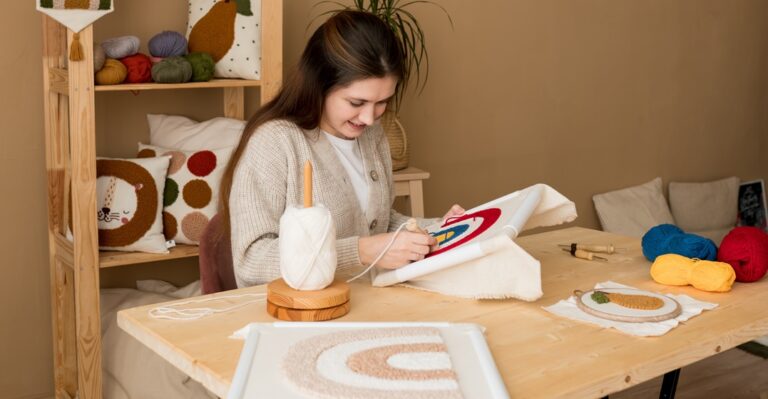
May 06, 2024
How to talk about your hobbies in German
If you’re starting your adventure with the German language, diving into conversations about your hobbies can be a fantastic icebreaker....

Apr 23, 2024
How to rent an apartment in Germany
Finding the right apartment in Germany can seem daunting, especially for expats and international students unfamiliar with the local norms....

Apr 18, 2024
Say it right: How to compliment someone in German
A well-timed compliment can put a smile on someone’s face, but context matters — especially when you’re attempting to give...
Level up your language skills with Lingoda. Take our placement test for free and get started.

- German In Austria A Guide...
German in Austria: A Guide to the Austrian Language

Although Austria and Germany officially share the same language, there are considerable differences in the words and phrases spoken in each country, as well as how people use them in everyday life.
Austrian writer Karl Kraus (1874-1936) nailed it when he said that the main thing that distinguished Germans from Austrians was their common language. While the official language of both countries is derived from the West Germanic language that dates back to Roman times and is also spoken in parts of Switzerland, Italy, Belgium, Luxembourg and Liechtenstein, the difference in both use and terms can often cause misunderstandings. Indeed, Austrian German, with its many dialects, is so diverse that it is now the only pluricentric language officially recognised by the EU. And while in writing and formal contexts, the Austrian ‘High German’ is fairly similar to the German version of the same, there are significant variations in informal conversations.
A great way to get an insight into the language spoken in Austria is to listen to Austrian dialect bands such as Wanda, Seiler & Speer and Krautschädl. But for a brief introduction to some popular Austrian-language phrases, Culture Trip has chosen a selection of key terms and expressions.
Das geht sich (nicht) aus
Although it’s extensively used in Austria, this sentence will leave most Germans and Swiss Germans utterly confused. Das geht sich aus or the even more popular Das geht sich nicht aus essentially means that something is (or isn’t) possible. Depending on the context, the reason for its feasibility may be time, money or physical space. While the phrase’s origin is not entirely clear, it may have derived from the Czech to se nevyšlo or to se nepovedlo .
Aufgewärmt ist nur ein Gulasch gut
When translated, this phrase means ‘Only goulash tastes good when heated up twice.’ However, in Austria, the expression is widely used when discussing relationships – and break-ups. It means ‘you need to let go’ and could allude to the past in general or an ex or an on-again, off-again partner. As for the beloved national dish in the phrase, it is widely believed that goulash does taste great when heated up for the second time – it’s even better (unlike most second attempts in love).

Leiwand is frequently used in informal conversations in Vienna and is a positive adjective – the equivalent to ‘great’, ‘amazing’ or ‘awesome’. Anything can be, look or taste leiwand , from a person to a song, a cake or your newest pair of jeans. It is said to originate from the word leinwand , meaning ‘canvas’, which was of high value in Austria in the Middle Ages, especially as part of a dowry. Vienna even served its own ‘canvas beer’ called Leinwandbier in the 15th century, which was brewed in the Bürgerspital (a hospital) – which seems pretty leiwand . At the time, to call something leiwand in Vienna was to say that it was as good as the said beer.
Schmäh führen
Schmäh means ‘trick’, ‘joke’ or ‘fib’ in Austrian German and is also used to describe Viennese humour, which is very specific to the city and has a reputation for being particularly sarcastic and morbid. Schmäh führen , a very common phrase in Austria that is pretty much unknown in Germany, can be best translated as ‘joking’. There are different theories about its origination. One hypothesis is that it dates back to the 11th to 14th centuries when smæhe was a popular term for ‘insult’ in Middle High German (the German language spoken in the High Middle Ages), while another links it to the word schmee (‘lie’) from the Middle Ages or the Yiddish term schemá (‘narrative’).
Originally a Viennese slang term popular with teenagers and millennials, Oida is a modern phrase that has since spread to all parts of Austria and age groups (but not across the borders to either Germany or Switzerland). The word is so heavily used in informal conversations these days that you might even see it printed on T-shirts. Oida essentially means ‘Dude!’, but it is also used to complain about something or to express general displeasure or dismay about a situation, a person or someone’s bad luck.
This one-word phrase means ‘Ready?’ or ‘Are we ready?’ and is the Austrian equivalent to the German Fertig ? and Seid ihr fertig ? It is often followed by Ja. Gemma !, which can best be translated as ‘Yes, let’s go.’
Das taugt mir
Taugen originates from the Middle High German words tougen and taugen and means ‘useful’. However, in Austria and Bavaria, the phrase is commonly used to indicate appreciation for something. Das/Der/Die taugt mir can refer to things as well as people, so you can use it to express pleasure with everything from music to your cat, a particular fashion style or a new love interest.

Na no na net!
While Austrians generally tend to shorten German phrases and words, in contrast, Na no na net is the long version of a simple ‘yes’, ‘obviously’ or ‘of course’. In Germany, the equivalent would be something like klar . Na no na net is mainly used in and around Vienna to emphasise that something that had just been said is very obvious; the phrase is often paired with the rolling of your eyes.
Heuer , meaning ‘this year’ in Austrian German, is a simple and very common term that tends to confuse Germans as it simply doesn’t exist in the language spoken in Germany – except for in parts of Bavaria. The word has its roots in the Middle High German hiure and the Old High German (the earliest version of the German language) hiuro and hiuru and basically had the same meaning in the 11th century that it has today. You might also notice that wine taverns are called Heurige in Austria. This name is an abbreviation of heuriger Wein , meaning this year’s wine.
Bist du deppert!
Deppert is an adjective that means ‘stupid’ or ‘idiotic’ in the Austrian dialect, so saying Bist du deppert is to call someone an idiot. However, in everyday slang, the phrase is also used to express amazement at something or someone, similar to the English words ‘wow’ or ‘awesome’. The expression is especially prevalent in eastern Austria. Be careful with using the phrase in Germany, though, as people might take it literally and get offended.
Like it or not, smoking is still widespread in Austria, so it probably doesn’t hurt to know the correct Austrian-language term for cigarettes: Tschick . According to one theory, the dialect word originates from Slavik languages, in which the ‘c’ in ‘cigarette’ is pronounced as ‘tsch’. Another theory links the word to the Italian cicca (‘fag’). Tschick can also be used as a verb, tschicken , meaning ‘smoking’.
Since you are here, we would like to share our vision for the future of travel - and the direction Culture Trip is moving in.
Culture Trip launched in 2011 with a simple yet passionate mission: to inspire people to go beyond their boundaries and experience what makes a place, its people and its culture special and meaningful — and this is still in our DNA today. We are proud that, for more than a decade, millions like you have trusted our award-winning recommendations by people who deeply understand what makes certain places and communities so special.
Increasingly we believe the world needs more meaningful, real-life connections between curious travellers keen to explore the world in a more responsible way. That is why we have intensively curated a collection of premium small-group trips as an invitation to meet and connect with new, like-minded people for once-in-a-lifetime experiences in three categories: Culture Trips, Rail Trips and Private Trips. Our Trips are suitable for both solo travelers, couples and friends who want to explore the world together.
Culture Trips are deeply immersive 5 to 16 days itineraries, that combine authentic local experiences, exciting activities and 4-5* accommodation to look forward to at the end of each day. Our Rail Trips are our most planet-friendly itineraries that invite you to take the scenic route, relax whilst getting under the skin of a destination. Our Private Trips are fully tailored itineraries, curated by our Travel Experts specifically for you, your friends or your family.
We know that many of you worry about the environmental impact of travel and are looking for ways of expanding horizons in ways that do minimal harm - and may even bring benefits. We are committed to go as far as possible in curating our trips with care for the planet. That is why all of our trips are flightless in destination, fully carbon offset - and we have ambitious plans to be net zero in the very near future.

Places to Stay
The best spa hotels to book in vienna, austria.

Hip Apartments in Vienna You'll Want to Call Home

Meet Thomas Schäfer-Elmayer: the Man Who Inspires Vienna’s Teenagers to Waltz

See & Do
Explore hidden vienna with these memorable experiences.

Stay Curious: Experience Vienna From Your Living Room

Meet the First Female Rider at Vienna’s Spanish Riding School

Waltzing With Pride: Vienna’s Rainbow Ball Celebrates Diversity and Inclusivity

A Violin-Maker’s Guide to Vienna With Bärbel Bellinghausen

Guides & Tips
A complete guide to the perfect weekend in the world's most liveable city.

Experience Vienna’s Quirky Side With These Unique Experiences

Food & Drink
'pus springs': the story behind photographer stefan fuertbauer’s 'eiterquellen' series.

The History of the Türkis Rosa Lila Villa, Vienna’s LGBTQ Landmark
Culture trip spring sale, save up to $1,100 on our unique small-group trips limited spots..

- Post ID: 1001290171
- Sponsored? No
- View Payload
What are You Looking for?
- Artificial Intelligence
- Cryptocurrency
- Founder Stories
- Government Policy
- Media & Entertainment

Master Top 50 Must-Know Austrian Phrases Before Your Trip
Table of contents show, saying hello and goodbye, please, thank you, and you’re welcome, apologies and excuses, asking for and understanding directions, public transportation phrases, phrases for renting a car or bike, ordering food and drinks, special dietary requirements and preferences, compliments and complaints at a restaurant, booking a place to stay, check-in and check-out phrases, requesting amenities and services, basic shopping vocabulary, bargaining and discussing prices, asking for recommendations, health emergencies and doctor visits, legal help and reporting issues, lost items and finding help, friendly small talk, invitations and arranging to meet, compliments and common courtesies, understanding local festivities, famous austrian idioms and sayings, cultural etiquette and manners, immerse yourself with confidence.
Planning a trip to Austria? Whether you’re dreaming of exploring Vienna’s imperial palaces, skiing in the Alps, or indulging in the country’s famous coffee culture, there’s one thing that can make your experience even more authentic: speaking the local language. And don’t worry, you don’t need to be fluent. Learning just a few key phrases can go a long way.
Imagine ordering your coffee in German, asking for directions to the nearest museum, or simply exchanging pleasantries with the locals. Not only does it enrich your travel experience, but it also shows respect for the culture you’re visiting. So, before you pack your bags, let’s dive into the top 50 phrases you should learn before traveling to Austria. Trust us, your efforts won’t go unnoticed.
The Essentials: Greetings and Politeness
Navigating your way through Austria demands more than just a basic understanding of the landmarks and local cuisine. Diving into the intricacies of local communication will not only make your journey smoother but also richer. This section covers the fundamental phrases in greetings and politeness, setting you up for respectful and authentic interactions.
A simple “hello” or “goodbye” can go a long way in Austria. When you greet someone, it’s not just about the words; it’s about the respect and acknowledgment you convey. During the day, you’ll use “Guten Tag” (Good day) to say hello and “Auf Wiedersehen” (Goodbye) when parting. However, in informal settings, “Hallo” for hello and “Tschüss” for goodbye are perfectly acceptable. It’s crucial to match the formality of your greeting to the situation.
Politeness is a key aspect of Austrian culture, and using these phrases generously will always work in your favor. To say please, you’ll use “Bitte” , which also conveniently means “you’re welcome” in response to thank you – “Danke” . This interchange of politeness not only shows respect but also demonstrates a willingness to engage with the local customs. Remember, a little politeness goes a long way, and recognizing the importance of these phrases will certainly enhance your interactions.
Whether you’ve stepped on someone’s foot on a crowded tram or you’re navigating through a misunderstanding, knowing how to apologize is crucial. The simple “Entschuldigung” (Excuse me/Sorry) can diffuse many a situation. Additionally, if you find yourself needing to get past someone in a crowded space, “Entschuldigung” works to signal your intent politely. It’s these small acknowledgments of courtesy that can significantly impact your day-to-day experiences while exploring Austria.
Navigating the Basics: Directions and Transportation
When you’re exploring Austria, navigating your way through its picturesque towns and vibrant cities is part of the adventure. Understanding how to ask for directions and familiarizing yourself with phrases related to transportation can significantly ease your travel experience. Here’s how you can confidently find your way around and make the most of Austria’s transportation options.
Navigating a new place can be daunting, especially if you’re not familiar with the local language. Knowing how to ask for directions in German, Austria’s official language, will not only help you get to your destination but also opens up opportunities for local interactions.
- “Wo ist der (die)…?” means “Where is the…?” This simple phrase can be a lifesaver.
- “Können Sie mir bitte auf der Karte zeigen?” translates to “Can you please show me on the map?” This is particularly useful if you’re visual and need more than verbal instructions.
- “Ist es weit von hier?” which means “Is it far from here?” to gauge if you can walk or need transportation.
Understanding responses such as “geradeaus” (straight ahead), “links” (left), and “rechts” (right) will help you navigate easily. Also, phrases like “in der Nähe von” (near) and “neben” (next to) can provide context to the directions you receive.
Austria boasts an efficient public transportation system. Familiarizing yourself with a few key phrases can enhance your travel experience, allowing you to navigate the system like a local.
- “Ein Ticket nach [destination], bitte.” means “A ticket to [destination], please.” It’s crucial when purchasing tickets.
- “Welche Linie fährt zum/zur [destination]?” translates to “Which line goes to [destination]?” This is especially helpful when using buses or trams.
- “Wo ist die Haltestelle/Bahnstation?” means “Where is the stop/train station?” Knowing this question can help you find your departure point.
Renting a car or bike offers the freedom to explore Austria at your own pace. Here are some phrases to smooth out the rental process.
- “Ich möchte ein Auto/ein Fahrrad mieten.” translates to “I would like to rent a car/a bike.” It’s a straightforward way to initiate your rental.
- “Was kostet es pro Tag?” means “How much does it cost per day?” Discussing the price upfront avoids surprises.
- “Gibt es eine Versicherung inklusive?” asks “Is insurance included?” It’s important to know what’s covered in your rental agreement.
Arming yourself with these phrases not only eases your exploration but also enriches your travel experience, opening up deeper connections with Austria’s culture and people.
Food and Dining: Eating Out
When traveling to Austria, indulging in local cuisine is a must-do activity that allows you to truly immerse yourself in the country’s rich culture and traditions. Austria is known for its diverse and hearty meals, exquisite pastries, and world-renowned beverages. Understanding the basics of food and dining etiquette, as well as learning a few key phrases, will enhance your dining experience and enable you to navigate Austrian eateries like a pro.
In Austria, dining is considered an experience rather than just a meal. When you’re ready to order, starting with a polite greeting such as “Guten Tag” (Good day) sets a positive tone. Knowing how to say “Ich hätte gerne…” (I would like…) followed by the name of the dish or drink you’re choosing is essential. For drinks, phrases like “Ein Glas Wein, bitte” (A glass of wine, please) or for beer lovers, “Ein Bier, bitte” can come in handy. It’s also common to ask for recommendations with “Was empfehlen Sie?” (What do you recommend?).
Here are a few key phrases:
- Menü Bitte (Menu, please)
- Ich möchte zahlen (I would like to pay)
- Kann ich die Speisekarte sehen? (Can I see the menu?)
Remember, being polite and saying “Bitte” (please) and “Danke” (thank you) goes a long way in Austria.
Austria’s culinary scene can accommodate a variety of dietary needs, but it’s crucial to communicate your requirements clearly. Whether you’re vegetarian, vegan, gluten-free, or have specific food allergies, knowing how to express this in German will ensure a smoother dining experience. Phrases like “Ich bin Vegetarier/Vegetarierin” (I am vegetarian), “Ich esse kein Gluten” (I don’t eat gluten), or “Ich habe eine Nussallergie” (I have a nut allergy) are important. Always ask “Enthält dies…?” (Does this contain…?) if you’re unsure about a dish.
Here’s a quick guide to expressing dietary preferences:
- Ich bin allergisch gegen… (I am allergic to…)
- Haben Sie vegetarische Gerichte? (Do you have vegetarian dishes?)
- Ist das Gericht vegan? (Is this dish vegan?)
Whether your meal exceeds expectations or falls short, knowing how to articulate compliments or concerns respectfully is essential. For a delightful dish, saying “Das war ausgezeichnet” (That was excellent) shows your appreciation and respect for the chef’s work. If you encounter issues with your order, it’s best to remain polite and calm, using phrases like “Entschuldigung, aber das ist nicht, was ich bestellt habe” (Excuse me, but this is not what I ordered) or “Mein Essen ist kalt” (My food is cold). Remember, constructive feedback is more likely to be received positively.
- Das schmeckt sehr gut (This tastes very good)
- Könnten Sie bitte… (Could you please…) for any request.
By equipping yourself with these phrases, you’ll not only navigate dining experiences more effectively but also show respect and appreciation for Austrian culture and cuisine.
Accommodation Language Guide
Venturing into Austria isn’t just about the sightseeing and culinary delights; it’s also about where you rest your head at night. Finding the right accommodation and communicating your needs effectively can significantly enhance your travel experience. Mastering a set of phrases related to accommodation can transform your stay from satisfactory to exceptional.
When booking accommodation in Austria, clarity and politeness are key. Here are a few phrases that’ll help smoothen this process:
- “Haben Sie ein Zimmer frei?” (Do you have a room available?)
- “Ich möchte ein Zimmer reservieren.” (I’d like to reserve a room.)
- “Kann ich das Zimmer vor der Buchung sehen?” (Can I see the room before booking?)
- “Ich reise mit Familie, haben Sie Familienzimmer?” (I’m traveling with family, do you have family rooms?)
Knowing how to ask for the type of accommodation that fits your needs, whether it’s a single room, a double, or suitable for a family, ensures that you and your travel companions are comfortable.
Ease your check-in and check-out process at hotels or guesthouses with these essential phrases:
- “Ich habe eine Reservierung auf den Namen [Ihr Name].” (I have a reservation under the name [Your Name].)
- “Wie spät ist der Check-out?” (What time is check-out?)
- “Können wir später auschecken?” (Can we check out later?)
Understanding these phrases helps you navigate the first and last moments of your accommodation experience smoothly, giving you the confidence to manage timings according to your travel schedule.
Your comfort during your stay is paramount. Whether you need extra pillows, have a problem with your room, or need recommendations for local dining, knowing how to ask for what you need makes all the difference:
- “Könnte ich ein zusätzliches Kissen bekommen?” (Could I get an extra pillow?)
- “Das Internet funktioniert nicht auf meinem Zimmer.” (The internet does not work in my room.)
- “Wo ist das nächste Restaurant?” (Where is the nearest restaurant?)
By preparing yourself with these phrases, your stay in Austria will not just meet your basic needs but also add to the overall richness of your travel experience. Remember, communication is the key to unlocking a more enjoyable and fulfilling journey. So, arm yourself with these phrases and ready yourself for an unforgettable Austrian adventure.
Shopping and Leisure: Making Purchases
When you’re exploring Austria, engaging in shopping and leisure activities offers a brilliant way to immerse yourself in the local culture. Navigating these experiences with some basic phrases up your sleeve can elevate your travels from good to unforgettable. Let’s dive into the essential vocabulary and phrases that’ll make shopping in Austria a breeze.
Before you hit the charming streets of Austrian cities, familiarizing yourself with some basic shopping vocabulary is crucial. Here’s what you need to know:
- “Kaufhaus” (department store) and “Markt” (market) are good starting points for where to shop.
- To ask if a shop sells something specific, use “Verkaufen Sie…?” (Do you sell…?).
- Understanding sizes like “klein” (small), “mittel” (medium), “groß” (large) can help when looking for clothes or shoes.
- When it comes to paying, ask “Kann ich mit Karte zahlen?” (Can I pay by card?) or “Wo ist die Kasse?” (Where is the cashier?).
These phrases will not only help you locate what you’re looking for but also streamline the purchasing process.
In local markets or smaller shops, discussing prices and bargaining can be part of the shopping experience. While it’s not as common in department stores or supermarkets, knowing how to navigate price discussions can help you snag a deal or two. Here’s how to approach it:
- Start by asking the price: “Wie viel kostet das?” (How much does this cost?).
- If you’re considering making a purchase but find the price steep, say “Das ist zu teuer.” (That’s too expensive). It can open up the conversation for a discount.
- To propose a lower price, use “Kann ich es für [price] haben?” (Can I have it for [price]?).
Remember, being polite and smiley during these interactions can go a long way in successfully negotiating a better price.
Whether you’re looking for a unique gift or the best local produce, asking for recommendations is a great strategy. Shopkeepers and locals usually have a wealth of knowledge about hidden gems that you won’t find in guidebooks. Key phrases include:
- “Was empfehlen Sie?” (What do you recommend?).
- If you’re looking for something specific, try “Ich suche ein Geschenk, haben Sie Empfehlungen?” (I’m looking for a gift, do you have any recommendations?).
- To get more personalized options, elaborate on your interests: “Ich interessiere mich für lokale Kunst. Haben Sie Vorschläge?” (I’m interested in local art. Do you have any suggestions?).
By showing an interest in local recommendations, you’ll not only find unique items but also engage in meaningful interactions that enrich your travel experience.
Arming yourself with these phrases and vocabulary will not only make shopping and leveraging leisure activities in Austria more enjoyable but also deepen your connection to Austrian culture.
Emergency Situations: Staying Safe
Emergencies can happen anywhere, and while you’re exploring Austria, it’s essential to stay prepared. Knowing key phrases that can help during unforeseen situations ensures not only your safety but also enhances your travel experience. Let’s dive into essential language tips for navigating emergencies smoothly.
If you find yourself in a health-related emergency or need medical assistance, being able to communicate effectively can make a significant difference. Here are a few phrases to keep in mind:
- “Ich brauche einen Arzt” – I need a doctor.
- “Wo ist das nächste Krankenhaus?” – Where is the nearest hospital?
- “Ich fühle mich nicht gut” – I don’t feel well.
- “Rufen Sie einen Krankenwagen” – Call an ambulance.
Remember, pharmacies in Austria are marked as “Apotheke” , and pharmacists often speak English. However, conveying your symptoms or the medicine you need in German can expedite the process.
In case you encounter legal troubles or need to report an incident, specific phrases can help you navigate the situation with local authorities. Here are essential phrases:
- “Ich muss die Polizei rufen” – I need to call the police.
- “Wo ist die nächste Polizeistation?” – Where is the nearest police station?
- “Ich möchte einen Diebstahl melden” – I would like to report a theft.
- “Ich brauche einen Rechtsanwalt” – I need a lawyer.
It’s crucial to know that “Notruf” is the term for emergency in Austria, and 112 is the general emergency number that connects you to all services.
Losing personal items or documents can be distressing, especially in a foreign country. To get assistance, here are phrases you might find useful:
- “Ich habe meinen Pass verloren” – I have lost my passport.
- “Wo ist das Fundbüro?” – Where is the lost and found?
- “Können Sie mir helfen?” – Can you help me?
- “Ich habe meine Tasche verloren” – I have lost my bag.
For lost credit cards or mobile phones, it’s important to know the terms “Kreditkarte” and “Handy” respectively, to be more specific when seeking help.
Being prepared with these phrases ensures you’re better equipped to handle emergency situations in Austria. Whether it’s a health concern, legal matter, or a lost item, knowing how to communicate your needs is a vital part of staying safe and enjoying your Austrian adventure.
Socializing and Making Connections
When you’re traveling to Austria, mastering the art of socializing can enhance your experience significantly. Austrians are known for their warmth and hospitality, but showing respect and making an effort to speak their language can open doors to authentic interactions and unforgettable memories. This section will guide you through essential phrases for friendly small talk, making arrangements to meet, and expressing compliments and courtesies—skills that will not only enrich your stay but also help you forge genuine connections.
Small talk is the gateway to deeper conversations and making new friends in Austria. Use these phrases to break the ice:
- “Wie geht es Ihnen?” (How are you?)
- “Was machen Sie beruflich?” (What do you do for a living?)
- “Woher kommen Sie?” (Where are you from?)
- “Was halten Sie von…?” (What do you think about…?)
- “Haben Sie Empfehlungen für…?” (Do you have any recommendations for…?)
Remember, small talk is not just about exchanging pleasantries; it’s about showing interest in the other person’s life and opinions.
Whether you’re inviting new friends for coffee or arranging a meet-up at a local event, these phrases will come in handy:
- “Möchten Sie etwas trinken gehen?” (Would you like to go for a drink?)
- “Wann passt es Ihnen?” (When does it suit you?)
- “Lassen Sie uns treffen bei…” (Let’s meet at…)
- “Könnten wir uns um… Uhr treffen?” (Could we meet at… o’clock?)
- “Ich würde mich freuen, Sie wiederzusehen.” (I would be happy to see you again.)
Effective communication can make arranging meetings seamless and show your enthusiasm for spending time with your new acquaintances.
Compliments can brighten someone’s day and are a lovely way to show appreciation. Moreover, common courtesies reflect your manners and respect for Austrian culture:
- “Das steht Ihnen sehr gut.” (That looks very good on you.)
- “Ihre Hilfe wird sehr geschätzt.” (Your help is greatly appreciated.)
- “Was für ein schönes Lächeln!” (What a beautiful smile!)
- “Vielen Dank für Ihre Gastfreundschaft.” (Thank you very much for your hospitality.)
- “Entschuldigen Sie bitte.” (Excuse me, please.)
Being polite and kind never goes out of style, and in Austria, these small gestures can mean a lot.
By equipping yourself with these phrases, you’ll not only navigate social situations with ease but also leave a lasting impression on those you meet. Remember, language is not just about words; it’s about connecting with people, sharing experiences, and building bridges between cultures.
Cultural Insights: Festivals and Traditions
When you’re exploring Austria, diving into the local culture is a must to fully appreciate your journey. Austria is rich in traditions, from festive Christmas markets to the vibrant sounds of the Vienna Philharmonic’s New Year’s Concert. Understanding the local festivities can greatly enhance your travel experience.
Austria is home to an array of festivals that celebrate its rich heritage and the changing seasons. Here are a few you shouldn’t miss:
- Vienna Ball Season : From January to February, Vienna turns into a city of balls, with over 450 events offering an unforgettable experience of waltzing in magnificent locations.
- Salzburg Festival : Held in July and August, this world-renowned festival focuses on music and drama, featuring performances that showcase Austria’s deep-rooted cultural pride.
- Christmas Markets : Starting in late November, Austria’s towns and cities are adorned with Christmas markets that offer traditional crafts, foods, and the warm glow of holiday spirit.
To connect deeper with the locals, it’s helpful to know a few Austrian idioms and sayings. While you’ll get by with standard German phrases, sprinkling your conversation with local expressions can open doors to heartwarming interactions:
- “Das ist nicht mein Bier” : Literally, “That is not my beer,” meaning “That’s none of my business.”
- “Leben wie Gott in Frankreich” : “To live like God in France,” used to describe a very comfortable or luxurious life.
- “Jetzt geht’s um die Wurst” : “Now it’s about the sausage,” which means it’s time to get serious about something.
Understanding cultural etiquette is key to making a good impression and avoiding faux pas. Austrians value politeness and adhering to certain manners:
- Greetings : Always greet people with a firm handshake and maintain eye contact. Use titles and surnames until invited to do otherwise.
- Punctuality : Arriving on time is seen as a sign of respect. Whether it’s a business meeting or a casual gathering, make sure you’re not late.
- Dining Etiquette : If invited to someone’s home, bringing a small gift, such as wine or chocolates, is considered polite. Remember to wait for the host to invite you to start eating before you begin your meal.
By embracing these cultural insights, you not only enrich your travel experience but also pave the way for a more authentic and meaningful connection with the people and traditions of Austria.
Arming yourself with these top 50 phrases before setting foot in Austria is more than just about overcoming language barriers. It’s about showing respect for the local culture and traditions, which in turn opens up a world of enriching experiences. Whether you’re navigating the streets, indulging in the culinary delights, or engaging in the vibrant social scene, these phrases will be your key to a more authentic and meaningful journey. Remember, it’s not just about the words you speak but the connections you make and the cultural nuances you embrace that truly enrich your travel experience. So go ahead, dive into the Austrian way of life with confidence and let your newfound linguistic skills enhance your adventure.
- authentic interactions
- communication skills
- cultural adventure
- Speak Indonesian

Top 50 Korean Phrases You Must Know Before Your South Korea Trip

Master Top 50 Portuguese Phrases Before Your Trip: A Travel Must

Master 50 Essential German Phrases Before Your Trip to Germany
Leave a reply cancel reply.
Your email address will not be published. Required fields are marked *
Email Address
Save my name, email, and website in this browser for the next time I comment.
Submit Comment
This site uses Akismet to reduce spam. Learn how your comment data is processed .
German for Travelers: The Basic Travel Phrasebook
- History & Culture
- Pronunciation & Conversation
You hear it all the time. Don't worry, everybody in Germany (Austria/Switzerland) speaks English. You'll get along just fine without any German.
Well, since you're here at the German Language site, you know better. First of all, not everyone in German Europe does speak English. And even if they did, how rude of anyone going there not to bother learning at least the basics of the language.
If you're going to be in a German-speaking country for a long period of time, it's obvious you'll need to know some German. But often travelers or tourists going for a brief visit forget one of the most important elements in planning their trip: Deutsch. If you're going to Mexico, you want to know at least " un poquito de español ." If you're headed for Paris, " un peu de français " would be nice. Germany-bound travelers need "ein bisschen Deutsch" (a little German). So what's the minimum for a traveler bound for Austria, Germany, or German Switzerland?
Well, courtesy and politeness are a valuable asset in any language. The basics should include "please," "excuse me," " sorry ," "thank you," and "you're welcome." But that's not all. Below, we have prepared a short phrasebook with the most important basic German phrases for a traveler or tourist. They are listed in approximate order of importance, but that is somewhat subjective. You might think that "Wo ist die Toilette?" is more important than "Ich heisse..."
In parentheses (pah-REN-thuh-cees) you'll find a rudimentary pronunciation guide for each expression.
Travel Deutsch: Basic German for Travelers
Mixing any of the above phrases-for example, "Haben Sie..." plus "ein Zimmer?" (Do you have a room?) may work, but requires a bit more grammar knowledge than a real beginner is likely to possess. For instance, if you wanted to say, "Do you have a rental car?" you would have to add an -en to "ein" ("Haben Sie einen Mietwagen?"). But leaving it off would not prevent you from being understood-assuming you are pronouncing the basic German correctly.
You won't find too many questions in our guide. Questions require answers. If you ask a question in fairly decent German, the next thing you're about to hear is a torrent of German in the answer. On the other hand, if the restroom is left, right, upstairs, or downstairs, you can usually figure that out-especially with a few hand signals.
Of course, it's a good idea to go beyond the bare minimum if you can. Several important areas of vocabulary are relatively easy to learn: colors, days, months, numbers, time, food and drink, question words, and basic descriptive words (narrow, tall, small, round, etc.). All of these topics are covered in our free German for Beginners course.
You'll need to set your own priorities, but don't forget to learn at least some essential German before your trip. You'll have "eine bessere Reise" (a better trip) if you do. Gute Reise! (Have a good trip!)
Related Pages
German Audio Lab Learn the sounds of German.
German for Beginners Our free online German course.
Travel Resources and Links A collection of information and links for travel to and in German Europe.
Wo spricht man Deutsch? Where in the world is German spoken? Can you name the seven countries where German is the dominant language or has official status?
- How Did the Pennsylvania Dutch Get Their Name?
- How to Write Personal Letters in German
- German Phrasebook: In the Classroom
- The Two German Past Tenses and How to Use Them
- German Verbs with Prepositions 1 - German Lesson
- Capitalization in German
- Where To? (Wohin?)
- How to Speak Business German
- What Is the Bavarian Dialect in German?
- English to German Language Lesson: Shopping Vocabulary and Phrases
- Top German Mistakes Made by Beginners
- Asking for Directions in German
- German for Beginners: Study Tips
- Denglish: When Languages Collide
- True or False: German Almost Became the Official US Language
- Which Countries Speak German?

10 Essential Austrian Words and Phrases for Daily Vienna Life (Part 2)
10 essential austrian words and phrases for daily vienna life.

Ever listened to a conversation between Austrians and even though you understand German, you couldn’t get half of what was said? It’s not you”oida”, it’s the slang! Strongly linked to local cultural particularities, slang is evolved in all cultures around the world, where words and phrases make sense only when one is familiar to their cultural context. Dive right into it by reading this article.
While learning German is admittedly not an easy task in general, learning the language in Austria can come to be twice as tricky… but only if you let it. Due to differences between Austrian German and Standardized German – Hochdeutsch, you, my dear reader, will need to practice your skills not only in class during listening exercises, but in the outside world as well, where the language is spoken in real settings and pace. If you put in the effort, the mighty Austrian culture gods will “pfiat di”.
To help you during your journey of language discovery and exploration, we created a guide series (find part 1 here ) with words and phrases that are essential, taking from the fact that you will probably hear most of them, if not all, dozens of times in everyday life in Austria. We have chosen words and phrases that are contemporary and fun at the same time so you can use the newfound knowledge of their context to impress local friends and fellow language learners alike!
Useful, Everyday Words
Deppert . Also pronounced with a “T” instead of a “D” (ie.teppert), this adjective is synonymous to silly, stupid or slow. Not a particularly nice word as such, deppert is however very much used to show excitement, bewilderment or amazement. It is therefore not always used in a pejorative manner and you will most probably hear it amongst friends or individuals talking to themselves, staring angrily at their computers for not executing the obvious. If you ever drag-and-dropped an image into a Word file and the consequent formatting chaos doesn’t cause you to loudly exclaim “Bist deppert, oida?!”, we don’t know what will. Also, we would like your meditation tips as soon as possible, thank you very much!
Häusl/Heisl, das. Did you know that in Austria (and lower Germany), the suffix -l is used to describe something as small or cute, in the same way that – chen and -lein are? Using the logic of diminutive suffixes, can you guess what a friend of yours means when they ask you to show them the way to the Häusl ? What do you mean no? Häusl is clearly (sarcasm!) another word for toilet. Deriving from the times when toilets were built separated from the main structure of houses, the toilet came to be known as a small house, hence Häusl . It can, however, happen that someone can indeed refer to an actual small house as Häusl . Just keep context in mind, will you? Schanigarten, der .This is one of our favorite Austrian words, and it soon will be yours, too. A Schanigarten is the area directly outside of a bar, restaurant or cafe, usually the sidewalk, where as soon as the sun makes longer appearances and the temperature nears 20℃, owners will claim with tables and chairs for their guests to enjoy food, the weather and the passing traffic.
There are many possible backstories to the name Schanigarten but we have a favorite so we’ll stick with that. It is said that the first half of the word comes from the syllabic shortening of the phrase “Schau nur hin” (en. “Just watch”) → Scha n i.
Years and years ago, these restaurant-claimed public spaces attracted the gaze of stunned passersby who watched curiously as people enjoyed meals and drinks out in the open. Allegedly, this phrase was also used by aforementioned onlookers to indicate amusement, in that such locations were also frequented by women (God Forbid!), a rare sight at the time. Whether this backstory is true or not, or Schanigarten indicated the first establishment with tables and chairs in the open because it belonged to someone named Johann or Jean (Schani is a diminutive for those names) we’ll never know…That won’t stop us from chilling in various Schanigärten all summer long with a beer at hand though, we promise! (“ Kleines Café ” in the first district and “ Frida ” at Yppenplatz are two of our favorites.)
Häferl, das. We’ll give you a hint: You can pour milk into one, yet not make milk out of one. Häferl is not another way to say Hafer (en. Oats), which was our initial guess when we first heard the word. Häferl is the diminutive form of Hafen which indicates a pot, therefore meaning nothing else than a cup. However, when someone orders a Häferlkaffee , they want filter coffee with lots of milk served in a big cup with a handle. To say that Austrians can be picky with their coffee is an understatement. Habern . Do you know this moment when you have decided that you are going to start eating healthily and consume less than your average during the day, then arrive home very hungry and… devour everything in the fridge with supersonic speed? Or when you fly back home, after a while in Vienna, and your family welcomes you with a feast, which you ingest almost without taking any breaks to breath? Well, you get the gist! Habern means to eat food with a great appetite and speed.
Haberer/Hawara, der . Now, not to confuse this as having anything to do with the verb habern, der Hawara is just your average dude, guy or male friend. A German synonym would be the word Kumpel. It can be also used to indicate someone’s boyfriend in informal settings, as in “Der Blond da ist der neue Hawara von Laura”. The word is said to have derived from Hebrew.
Useful, Everyday Phrases
Pfiat di. You know how “Grüß Gott” and “Grüß di” are equivalent to “Hallo” and “Guten Tag”. Pfiat di/ Pfiat eich is synonymous to “Tschüss” or “Auf Wiedersehen”, an especially popular way of saying farewell amongst the older generations and in the countryside by people of all ages. The word Pfiat has originated from the verb “behüten”, meaning to watch over/protect, so it is a way of saying may God protect/watch over you. What a wholesome way to part ways with someone. Still struggling to understand how “behüt dich” turned to “pfiat di”? You can ask in class for a more detailed explanation of the change in phonetics. Ah..the wonder of Austrian German!
Geh, hear auf . Usually accompanied with an exaggerated break of the wrist facing forward, geh , hear auf translates really well to come on, stop.
It may be said in a cutesy way when one is receiving a compliment: – Wie schön siehst du denn, aber? (en. You look so good!) – A geh, hear auf! Or a means to signal that you don’t buy what your friend is saying: – Ich hab Conchita gestern Abend auf dem Weg nach Hause gesehen, sie saß neben mir im Bus. (en. I saw Conchita yesterday night on my way home, she sat next to me on the bus.) – Geh, hear auf! Or a way to just say stop it! – Ich werde nie einen Job/Mann finden.. (en. I will never find a job/guy) – Geh, hear auf!
Eh, Kloar . This translates to clearly or obviously and is used both earnestly and ironically.
– “Grelle Forelle” heut’ Abend? (en. Grelle Forelle tonight?) (“Grelle Forelle” is a famous techno club in Vienna) – Eh, Kloar! Or – Meine Mitbewohnerin hatte versprochen am Sonntag die Wohnung zu putzen..Sie schlaf stattdessen, den ganzen Tag! Sie ging Samstag in Grelle Forelle tanzen. (en. My roommate promised to clean the apartment on Sunday. She slept the whole day instead! She went dancing in “Grelle Forelle” on Saturday.) -Eh, Kloar!
Self explanatory which is meant earnestly and which ironically, right? Yes, you can answer with eh, kloar .
Na No Na Ned . No, the cat didn’t just walk all over the keyboard. Yes, it is a real expression used by the Viennese everyday, we swear! A word to word translation would result in four consecutive no’s. HOWEVER. This phrase actually means..drumroll please.. obviously. It’s so weird that we can’t help but love it! Shortened versions of na no na ned can be heard as no na ned and no na.
-Soll ich auch die Trüffelpommes bestellen? -Na no na ned!
I mean, who wouldn’t want to eat truffle fries? (Tip: Try the ones at Kleinod bar right on the edge of Stadtpark.. Yum)
Beware though. If there is a slight pause after “na”, which essentially would indicate a comma if written, then the phrase “Na, no ned” would translate to “No, not yet”!
On Learning New Words and Phrases in Austrian German
We hope you are having as much fun reading and learning these, as we have writing them. Overtime we came to understand that learning Austrian German little by little is like someone handing you a map of a secret city full of wonders, and letting you explore it exponentially day by day. Understanding what locals are saying and/or implying can give you a liberating feeling. This will make you more comfortable and confident in your everyday life, it can create opportunities for small talk and blending in and it will probably make you love the country and its quirkiness even more.
Today you have learnt the adjective deppert , the nouns Häusl, Schanigarten, Häferl , and Hawara , the verb habern , as well as the phrases Pfiat di, Geh Hear auf, Eh Kloar and Na No Na Ned .
Which of these Austrian German words and phrases surprised you the most? Did you happen to know any of them beforehand? Let us know in the comments below.
Daphne Demetriou, MA
Explore further

intensive courses
Reach your goals as quickly and efficiently as possible.

company courses
Tailor-made courses for your company

personal training
Private, flexible, and all about you.

university preparation
You need German for university – we’re here to help.

evening courses
Fit your learning around your schedule.

Take Austria’s German language exam here at INNES.
- Reset Password
Privacy Overview
How to Greet and Communicate in Austria: A Guide to Austrian Etiquette
- by Brian Thomas
- October 22, 2023
Austria, a beautiful country located in the heart of Europe, is known for its rich culture, stunning landscapes, and warm hospitality . If you’re planning a trip to this enchanting destination or simply interested in the Austrian way of life, it’s essential to familiarize yourself with the local customs and greetings. In this blog post, we’ll explore various aspects of Austrian culture, language, and etiquette, offering you insights into how to say good morning, express gratitude , and even order your favorite traditional breakfast.
From understanding the basics of Austrian greetings like saying “Guten Morgen” to discovering the country’s renowned dishes, we’ll delve into the nuances that make Austria unique. Additionally, we’ll explore how language plays a role in daily interactions, covering essential phrases such as “Danke” (thank you) and “Prost” (cheers) for those special moments shared over a drink. We’ll also uncover what is considered rude and respectful in Austrian society, ensuring you navigate your way through the country with ease and courtesy.
So, whether you’re curious about Austrian language and customs or eager to make the most of your upcoming trip, this blog post has got you covered. Let’s embark on a journey to unravel the secrets of how to greet, converse, and immerse yourself in the fascinating world of Austria!
Note: This blog post was created in 2023, so make sure to check for any updates regarding cultural practices or language conventions.
Feel free to adjust the length and content of the introduction section as per your requirements.

How to Greet Austrians with a Charming “Good Morning”
How to make mornings in austria more enchanting.
Ah, mornings. The perfect time to wake up, stretch, and greet the world with a smile. And what better way to start your day in Austria than by sharing a delightful “Guten Morgen” (Good morning) with the locals? Let’s dive right into the fun and explore some unique ways to say “Good morning” that will not only make Austrians smile but also leave them wondering if you’ve secretly been living in the heart of Vienna all your life.
Embrace the Austrian Vibe with “Grüß Gott”
When you want to immerse yourself in the Austrian culture and show off your language skills, swap your everyday “Good morning” for a more authentic greeting. Austrians love to use the phrase “Grüß Gott” as a way of saying “Hello” and “Good morning.” Literally meaning “Greet God,” this phrase is like a warm hug of politeness, reflecting the country’s rich traditions and strong religious heritage .
Rise and Shine with “Morgen”
If you’re in a hurry or simply appreciate brevity, you can keep it casual and use the word “Morgen” to greet your Austrian pals. While this might sound like saying “morning” in English, you’ll find that it blends seamlessly into the local culture. Just imagine strolling down the streets of Salzburg, casually nodding to passersby while saying “Morgen” with a touch of subtle coolness. It’s like mastering the art of speaking without many words at all.
Give Mornings a Touch of Elegance with “Guten Morgen”
Sometimes, simplicity is key. That’s when the classic “Guten Morgen” comes into play. You can’t go wrong with this versatile phrase. Whether you’re enjoying a delicious Viennese pastry (known as “Gugelhupf”) or sipping on a cup of aromatic coffee, a confident “Guten Morgen” is the Swiss army knife of morning greetings in Austria. It effortlessly blends politeness, class, and a touch of elegance that will leave the Austrians smiling.
Embrace Morning Adventures with “Hoppala”
Feeling a little daring and mischievous in the early hours? Then let out your inner Austrian rebel and surprise everyone with a quirky “Hoppala” instead. Now, you may be wondering why we’re suggesting this word when we’re talking about saying “Good morning.” Well, “Hoppala” is like an Austrian “oops” moment, but in the most endearing way possible. It’s a delightful way to add a touch of unexpected charm to your morning greetings and make the locals chuckle.
Now that you’ve learned a variety of greetings, saying “Good morning” in Austria will become an adventure. From the traditional “Grüß Gott” to the casual “Morgen,” or the elegant “Guten Morgen,” all the way to the mischievous “Hoppala,” each greeting will enable you to embrace the Austrian spirit and start your day with a smile. So, go forth and let your mornings in Austria be filled with linguistic charm and cultural curiosity. Guten Morgen, my newfound Austrian connoisseurs of friendliness and morning delight!

FAQ: How to Greet and Communicate in Austria
Welcome to our FAQ-style guide on greetings and communication in Austria! In this section, we’ll answer some common questions about Austrian language, customs, and etiquette. So, if you’ve ever wondered how to swear in Austrian or what Austria is known for, keep on reading!
How Do You Swear in Austrian
While it’s always best to maintain politeness and respect in any language, it’s only natural to be curious about colorful expressions. In Austria, when it comes to swearing, they’ve got their fair share of creative and unique phrases. You might hear locals using words like “Himmeldonnerwetter” (heavenly thunderstorm) or “Kruzifix” (crucifix) to express their frustration. However, let’s keep in mind that it’s generally best to avoid swearing altogether and focus on embracing the beautiful aspects of the Austrian culture.
What Food Is Austria Known For
Ah, Austrian cuisine – a true delight for food lovers! Austria is renowned for its hearty and flavorful dishes. You can’t miss out on trying some Wiener Schnitzel, a breaded and fried veal cutlet, or maybe a delightful slice of Sachertorte, a chocolate cake filled with apricot jam. Don’t forget to savor the taste of a traditional Austrian strudel, whether it’s sweet with apples or savory with spinach and cheese. Austria truly knows how to satisfy your taste buds!
How Do You Say “Kisses” in Austria
If you’re looking to send some virtual kisses in Austria, the word you’re looking for is “Bussis.” It’s a cute way to greet your friends and loved ones, or even sign off a message with a little extra love. So go ahead, spread those virtual Bussis around and bring a smile to someone’s face!
Is Vienna English-Friendly
Yes, indeed! Vienna, being a melting pot of cultures, is quite English-friendly. You’ll find that many locals, especially in tourism and service industries, speak English fluently. So, if you’re worried about any language barriers, rest assured that you’ll find plenty of English-speaking folks to assist you during your Viennese adventures.
How Do You Say “Thank You” in Austrian
To show your appreciation in Austria, simply say “Danke.” This universal word of gratitude will go a long way in expressing your thanks. Remember, a little appreciation goes a long way in any culture, so don’t forget to sprinkle your “Dankes” generously!
How Do You Say “Cheers” in Austria
When it’s time to raise a glass and make a toast in Austria, the word to remember is “Prost!” So whether you’re enjoying a nice cold beer, a glass of Schnapps, or even a refreshing glass of Almdudler (a popular Austrian herb soda), let out a hearty “Prost!” and join in the celebration.
What Is a Typical Austrian Breakfast
If you’re looking to start your day like a true Austrian, a typical breakfast might consist of freshly baked bread, butter, cold cuts like ham and salami, a variety of cheeses, and perhaps a soft-boiled egg. Oh, and let’s not forget the strong and aromatic Viennese coffee that will kick-start your day with a delicious jolt of energy!
What Is Austria Most Known For
Apart from its picturesque landscapes and enchanting music, Austria is most famous for its classical music composers, including the prolific Wolfgang Amadeus Mozart and the magnificent Ludwig van Beethoven. So, whether you’re strolling through the streets of Vienna or attending a classical concert, you’ll feel the harmonious presence of Austria’s rich musical heritage surrounding you.
What Is a Typical Austrian Greeting
When it comes to greetings in Austria, a simple and elegant “Guten Tag” (good day) will serve you well. Austrians appreciate polite and respectful interactions, so greet with a smile, maintain eye contact, and you’ll embrace the spirit of Austrian hospitality.

What Is the National Drink of Austria
While Austria may not have an official national drink, one beverage that holds a special place in the hearts of Austrians is the Wiener Melange. It’s a delicious mix of strong coffee, creamy milk, and a sprinkle of cocoa on top. So, when in Austria, sipping on a Wiener Melange is like experiencing a warm and comforting hug from the country itself.
What Is Considered Rude in Austria
In Austria, similar to many other cultures, impoliteness and disrespect are generally frowned upon. It’s important to avoid interrupting others while they’re talking, chewing gum loudly, or engaging in excessive small talk. Maintaining a sense of personal space is also appreciated, so try to avoid standing too close to others.
Is Austria Religious
Austria is predominantly a Catholic country. While Catholicism is the most practiced religion, Austria embraces religious freedom, allowing individuals to practice any faith they choose. So, whether you’re exploring the magnificent churches or simply observing Austrian religious traditions, you’ll find a fascinating blend of faith and culture.
What Does “Baba” Mean in Austria
If you happen to hear an Austrian saying “Baba,” don’t worry, it’s not a goodbye forever! “Baba” is an informal way of saying farewell, similar to “bye” in English. So, if you’ve made some Austrian friends during your visit, be sure to bid them a cheerful “Baba” when parting ways.
How Do You Say “Hello” in Vienna
In Vienna, locals typically greet each other with a warm “Servus.” This friendly salutation is similar to saying “hello” and is widely used throughout Austria. So, channel your inner Wiener and let out a hearty “Servus” to make a memorable impression!
What Is “Vielen Dank”
“Vielen Dank” is German for “Thank you very much.” So, if you want to express extra gratitude or emphasize your appreciation, add a dash of “Vielen Dank” to your “Dankes” for an extra touch of politeness.
How Do You Say “Goodnight” in Austria
When it’s time to bid someone goodnight in Austria, you can simply say “Gute Nacht.” This sweet and gentle phrase transcends language barriers and is sure to leave a lasting impression before you say your farewells and head off to dreamland.
How Do You Say “Please” in Austria
In Austria, when you need to politely ask for something, “Bitte” is the magic word. Whether you’re ordering a delicious Austrian specialty or seeking assistance, adding a “Bitte” to your request will ensure you’re well on your way to receiving the help you need with a touch of politeness.
How Is Austria So Rich
Austria’s wealth can be attributed to several factors. The country has a diverse and robust economy, ranging from tourism to manufacturing and finance. Its strategic location as a central hub in Europe has also played a significant role. Additionally, Austria places a strong emphasis on quality education, innovation, and social welfare, contributing to its overall economic prosperity.
Is Austrian German
Yes, the official language spoken in Austria is Austrian German. Although it shares similarities with German, there are some distinct dialects and vocabulary differences that make Austrian German its own unique linguistic experience. So, while you’re exploring the beautiful Austrian landscapes, prepare yourself for a delightful linguistic journey.
Now that you’ve armed yourself with these Austrian greetings and insights into the local culture, get ready to immerse yourself in this charming Alpine nation. Embrace the warm hospitality, savor the delightful cuisine, and explore the enchanting traditions. Enjoy your Austrian adventure, and as they say in Austria, “Viel Spaß!” (Have fun!)
- austrian culture
- austrian society
- austrian way
- beautiful country
- good morning
- guten morgen
- rich traditions
- strong religious heritage
Brian Thomas
Is your engine running lean or rich know the signs and symptoms, how to tell a college coach you want to commit, you may also like, what color represents frankincense.
- by Mr. Gilbert Preston
- October 24, 2023
Can Electrolytes Keep You Awake?
- October 12, 2023
Is Rumble good in Blox fruits?
- October 31, 2023
What Does “N” Mean on a Car: The Complete Guide
- by Thomas Harrison
- October 27, 2023
Jerry Lewis’ Last Words: Unveiling the Mystery Surrounding a Comedy Icon
- by Richard Edwards
- October 29, 2023
Can I Transfer Money from Credit Karma to Cash App?
- by Travis Heath
- October 10, 2023

20+ Austria Travel Tips for First Timers & Must Knows Before You Go
Last Updated: July 6, 2023
*FYI - this post may contain affiliate links, which means we earn a commission at no extra cost to you if you purchase from them. Also, as an Amazon Associate I earn from qualifying purchases. Check out our Privacy Policy and Disclosure. for more info.
Despite its relatively small size, Austria is a country packed to the brim with sights – from majestic mountains and opulent palaces to elegant cities and more stunning cakes than you could ever eat in one lifetime.
… it’s also full of potential culture shocks and silly travel mistakes.
I used to live just across the border in Munich, so over the years I’ve gotten to know Austria fairly well… the hard way! Namely by bumbling around, committing the faux pas and embarrassing myself in the name of research.
But luckily, you’re here just in time to prepare for Austria the easy way – by reading my full list of Austria travel tips, collected over years of first hand experience (and many a starry-eyed day trip from Munich to Salzburg ).
So, from avoiding saucy schnitzels to preparing for naked saunas, here are a few weirdly specific must-knows before you visit Austria. I hope you find it helpful!

Save this list of Austria Travel Tips for later!
You’ll be very glad you did.
1. Remember: Austria ≠ Australia
We’ll start with a silly Austria tip, and one that I (frankly) cannot believe needs saying.
But from US presidents to famous news outlets , it’s a gaffe that pops up time and time again, so, just to make sure we’re all on the same page… Austria is a country in Central Europe, and completely different to Australia, the Southern Hemisphere country famed for its kangaroos and koalas.
Walk around Austria for even a few minutes and you’ll come across silly souvenirs mocking this confusion, and probably a tour guide or two telling a joke about it.
So, again, before you start planning that Austria trip, make sure it’s mountains, schnitzel and Sound of Music you’re looking for, not the Outback, Didgeridoos, and giant spiders that hide in your shoes.
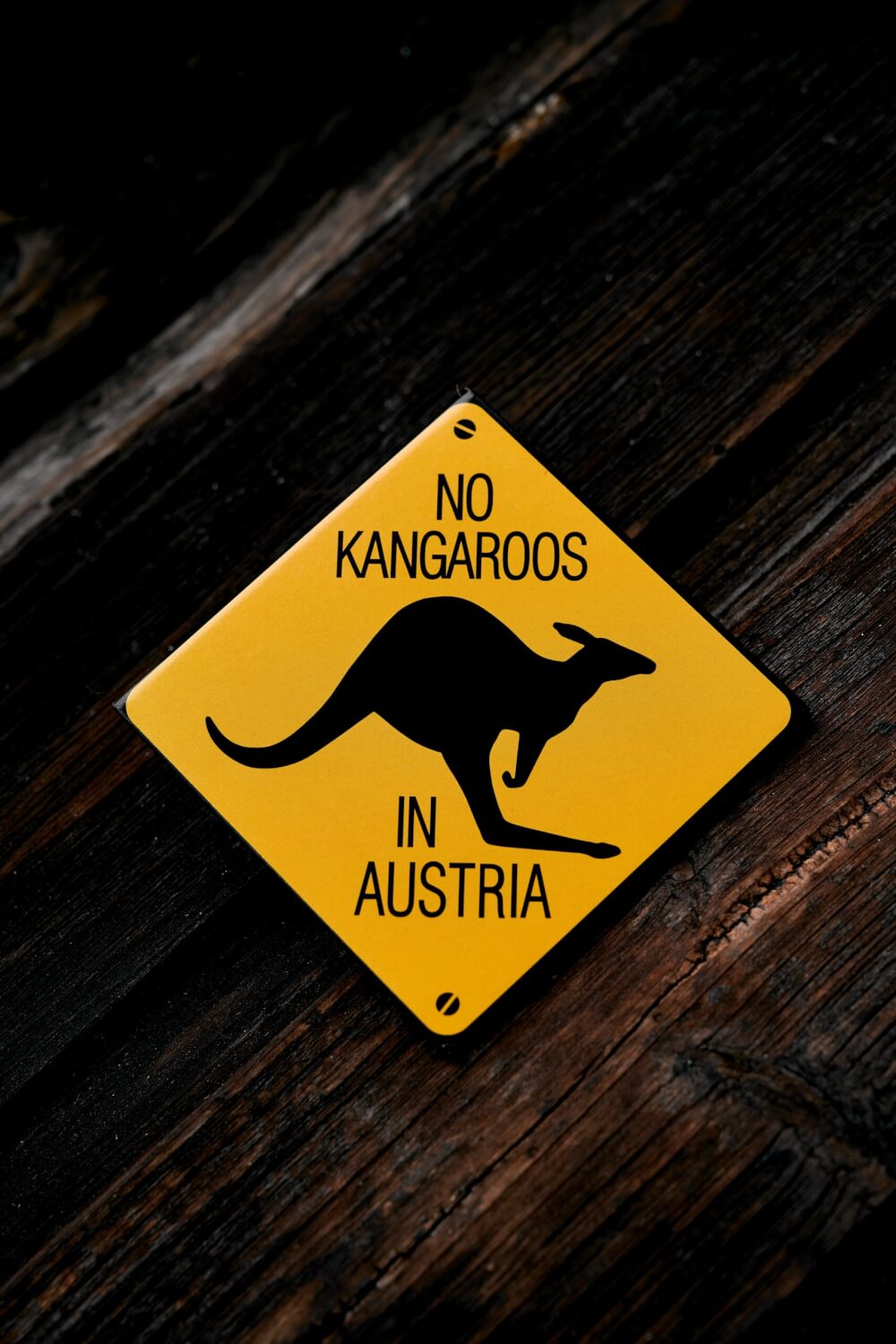
2. Never mistake Austrians for Germans
Just as Austria and Australia are (shockingly) not the same country, the same goes for Austria and its neighbour, Germany.
A very important Austrian etiquette tip I must shout from the rooftops is simply this: Austrians don’t take kindly to being mistaken for German.
So, remember to never say that Germany and Austria are the same, or make jokes about Germans and Austrians being the same. At best, they’ll laugh it off, at worst, you’ll cause legitimate offense.
Sure the two countries share a language and there are (admittedly) similarities, but Austrians are really proud of their country and don’t love it when people just dismiss them as the exact same as Germany, so keep that in mind.
As a Canadian who’s frequently mistaken for American, I totally get it.
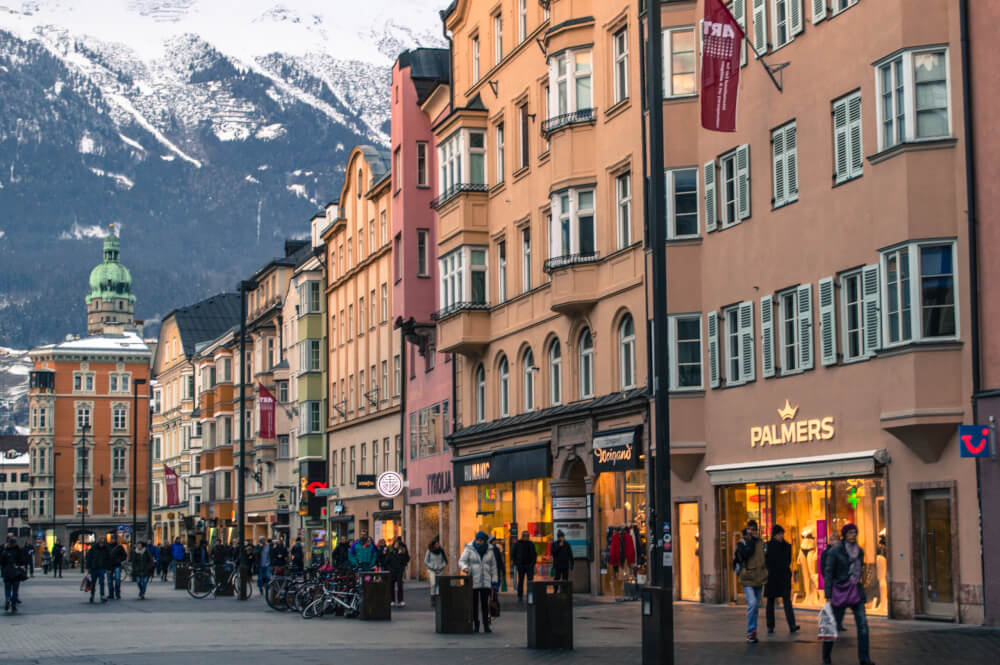
3. Be sure to add Austria’s nature spots to your itinerary
Now in terms of where to go in Austria, I find that overseas visitors often gravitate towards the country’s most famous cities, Vienna and Salzburg.
But there is SO much more to explore beyond that, especially Austria’s natural marvels, which many overseas visitors miss. In fact, it’s often Austria that Europeans choose for their nature-forward holidays (whether it be for skiing or hiking), so don’t miss out!
Filled with soaring mountains, glimmering lakes, and charming swathes of countryside, Austria is (in many ways) a more budget-friendly version of Switzerland, so I highly recommend extending your time and expanding your itinerary to include at least a day trip or two to take in some of these incredible natural landscapes.
There’s the valleys and waterfalls of Salzburgerland, the alpine majesty of Tyrol’s nature parks, the beautiful lakes of Carinthia, along with more under-the-radar picks like the Bregenzerwald in Vorarlberg (which offers amazing mountains and cute alpine towns).
All that to say – there’s plenty of amazing nature to be enjoyed in Austria, so don’t just limit yourself to cities.
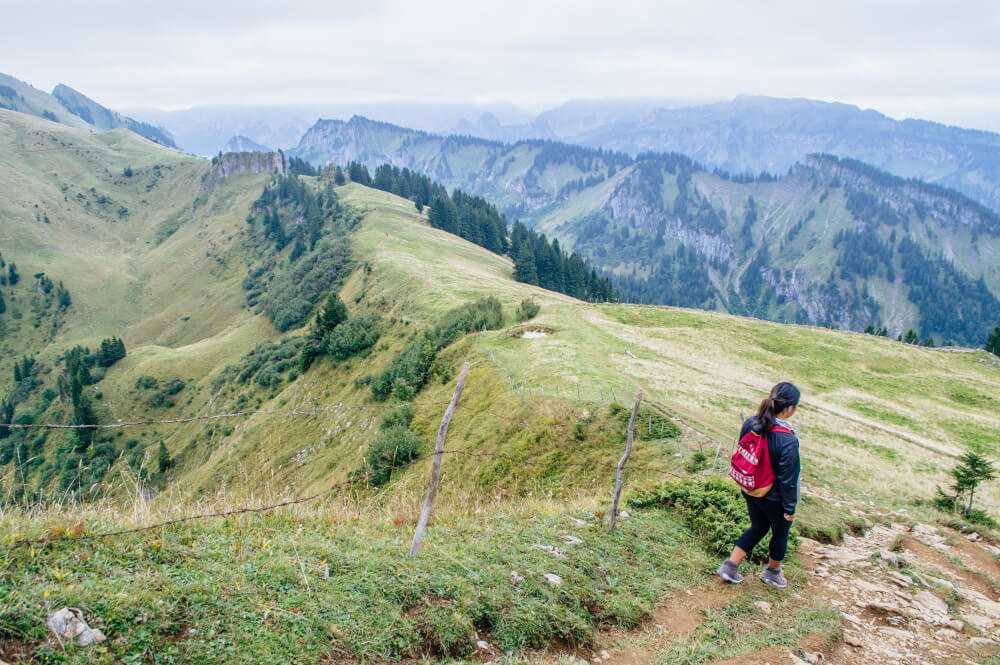
4. Seek out new destinations by reading Austrian websites
On that note, if you are open to visiting more offbeat places during your Austria trip, one thing I can highly recommend is doing your research on local Austrian websites.
In my opinion, there’s quite a big difference between the Austrian destinations that international tourists visit and the destinations that domestic tourists visit.
Both are great, but if you want to explore beyond the most famous sights, then reading Austrian blogs to see where locals vacation is a good starting point.
NOTE: This is also a great way to discover more offbeat things to do in individual cities as well. For instance, if I wanted to find more alternative things to do in Graz , I might browse local blogs/event websites to find pop-up events or unique festivals.
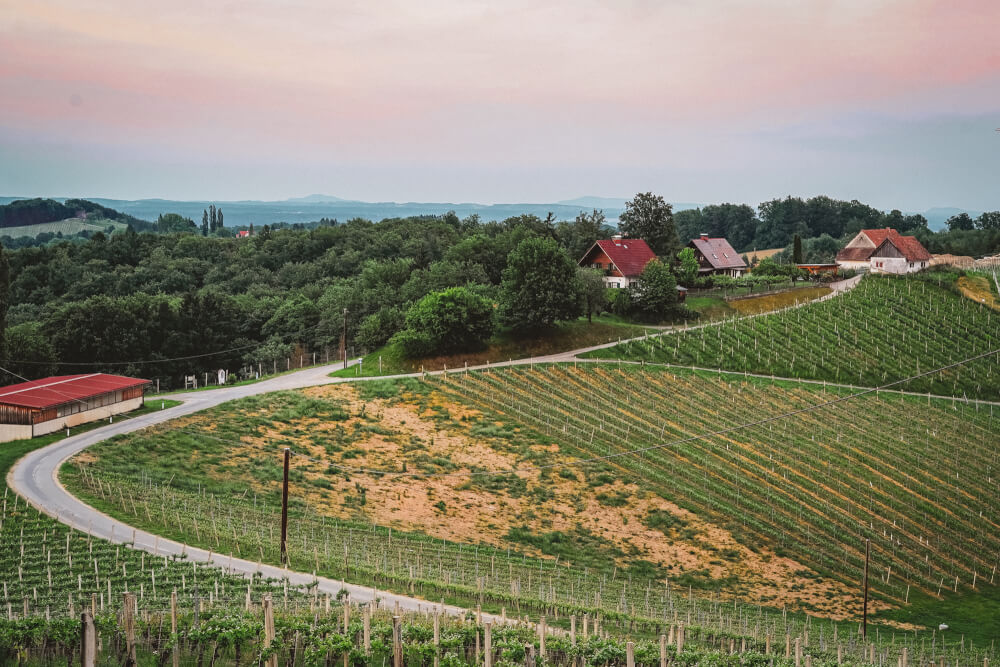
5. Don’t miss Austria’s Christmas markets
I know that neighbouring Germany is probably the best known country in the world for Christmas markets, but Austria has a fair few incredible gems too, often with far thinner international crowds.
So, if you’re looking for a magical winter destination in Europe, consider pencilling in some Austrian Christmas Markets between mid November to Christmas.

6. Learn the basics in German
In terms of which language to panic-learn before your trip, German is the official language of Austria, so that’s what everyone will speak.
In larger cities, it won’t be tough to get by with English, but it may be more difficult in the countryside.
In any case, it’s good to at least know the basics, like…
- Hello – Hallo (Ha-low!) or Grüß Gott (Grewss-got!)
- Thank you – Danke (Dahn-keh)
NOTE: The German spoken in Austria can sound very different depending on where you are because there’s a lot of different regional dialects, so don’t be surprised if you have trouble understanding locals (or vice versa). It’s all part of the fun!

7. Only rent a car if you plan to do nature trips
If your trip mainly consists of city to city travel, then I’d advise relying on public transport to save yourself the headache of driving.
Public transport is amazing in Austria, so you’ll have no trouble getting around, both from place to place and also within cities themselves.
But, if you plan to do a lot of more offbeat nature spots to see mountains, lakes and national parks, then having a car would be ideal. Be sure to check out my considerations before renting a car in Europe if that’s the case.
Of course, a more convenient alternative would be to book day tours to nature spots from the city you’re staying in – that way you can simply drool in the back seat while you see all the landscapes, without the stress of navigating.
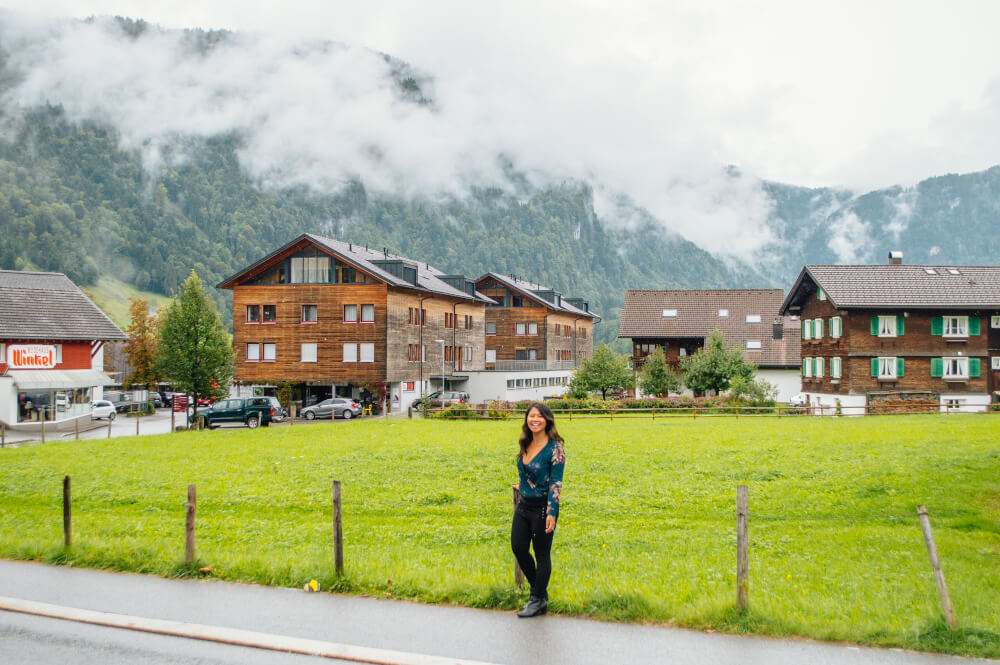
8. Get a vignette if you’re driving
If you do plan to rent a car however, one important Austria must-know is you’ll need a vignette.
This is a sticker that you must buy for your car in order to use the country’s motorways. Failure to procure one means an aggressive fine in the mail weeks after the fact. (Ask me how I know that).
IMPORTANT: Make sure this sticker is purchased and adhered to the car before you enter the country because there are automatic scanners that look for them at the border… so you may get fined even if you buy one upon entry. (Again, ask me how I know that)
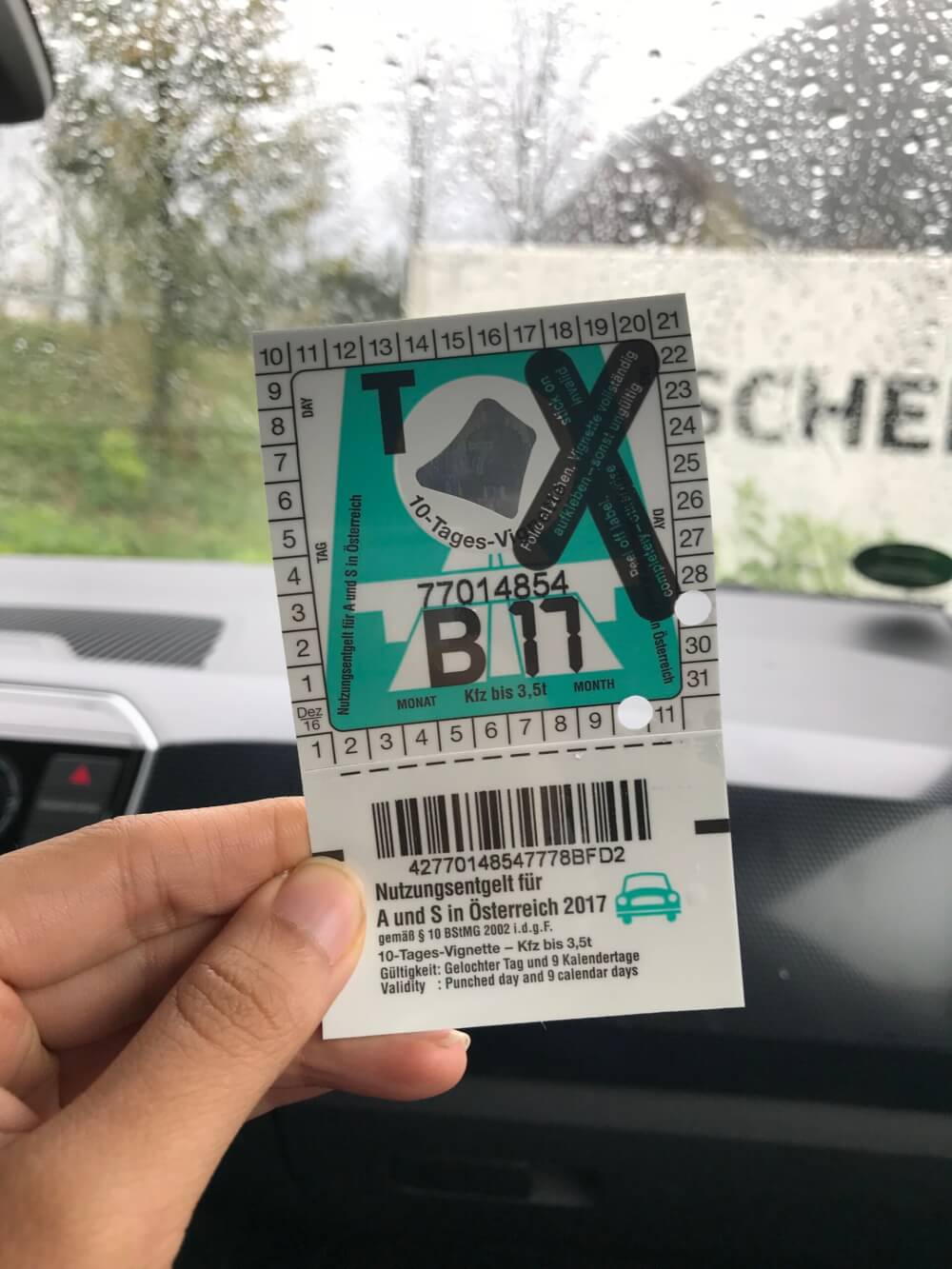
9. Understand that public transport is on an honour system
Unlike other countries which have fare gates and other measures in place to ensure you pay, public transport in Austria works on a very trusting honour system where you are responsible for buying your own ticket, and only need to show it if you are asked to (via random controls).
So, make sure you always buy the right ticket and validate it properly in case you get checked!
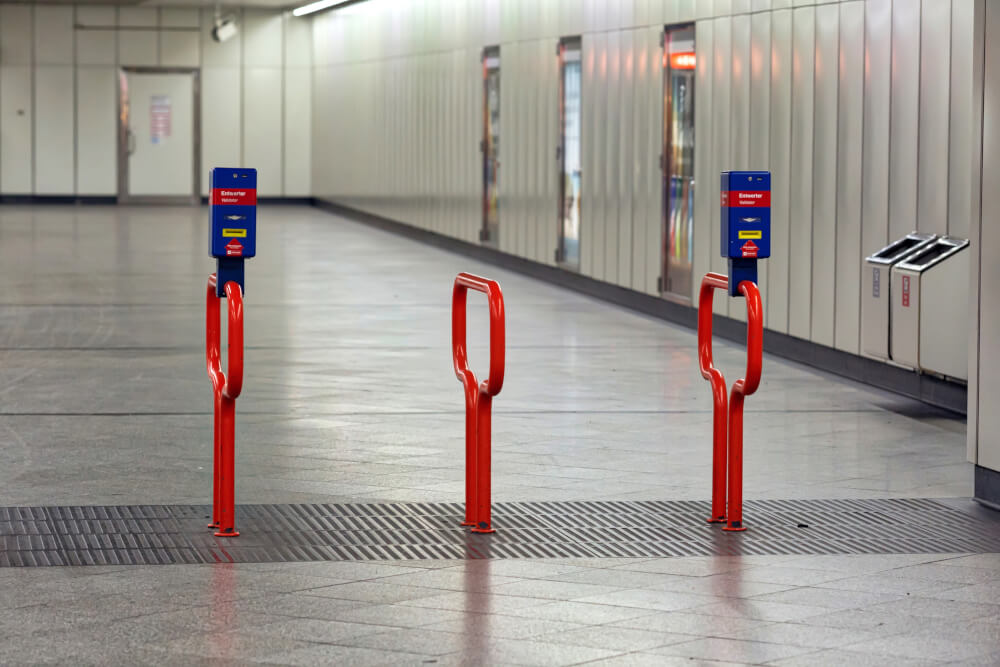
10. Learn the tricks to saving money on Austrian trains
Train travel is one of my personal favourite ways of getting around Austria. If you are new to train travel in Europe, then be sure to read my step by step guide to get acquainted, and scope out my favourite scenic train rides while you’re at it.
After you’ve decided that you do want to glide elegantly across the country by rail, then there are a few different ways to save money on tickets:
- Einfach-Raus-Ticket: A group ticket that gives you unlimited travel for a day on all local/regional trains across Austria. The more people you have, the cheaper it works out to be per person. Great for group day trips!
- Regional Tickets/Offers: Special passes that give you unlimited travel for a day on local/regional trains for a particular region/area. Great for day trips in a smaller area!
- Eurail: A rail pass that covers train travel across most European countries. Great only in certain instances, i.e. when you are visiting many countries and want flexibility/spontaneity. I explain more in my full Eurail review.

11. Sorry – Austrians do not know the Sound of Music
I hate to be the bearer of bad news.
And trust me – as someone who grew up watching the Sound of Music religiously every Christmas, this fact is definitely not one of my favourite things, but here goes…
Austrians do not really care about the Sound of Music. It’s not a classic film for them, they have no nostalgia tied to it, and (frankly) many of them don’t even like it.
So, when you head to Salzburg for your big Sound of Music pilgrimage, just know that your enthusiasm is probably best shared among your fellow tourists, rather than among locals.
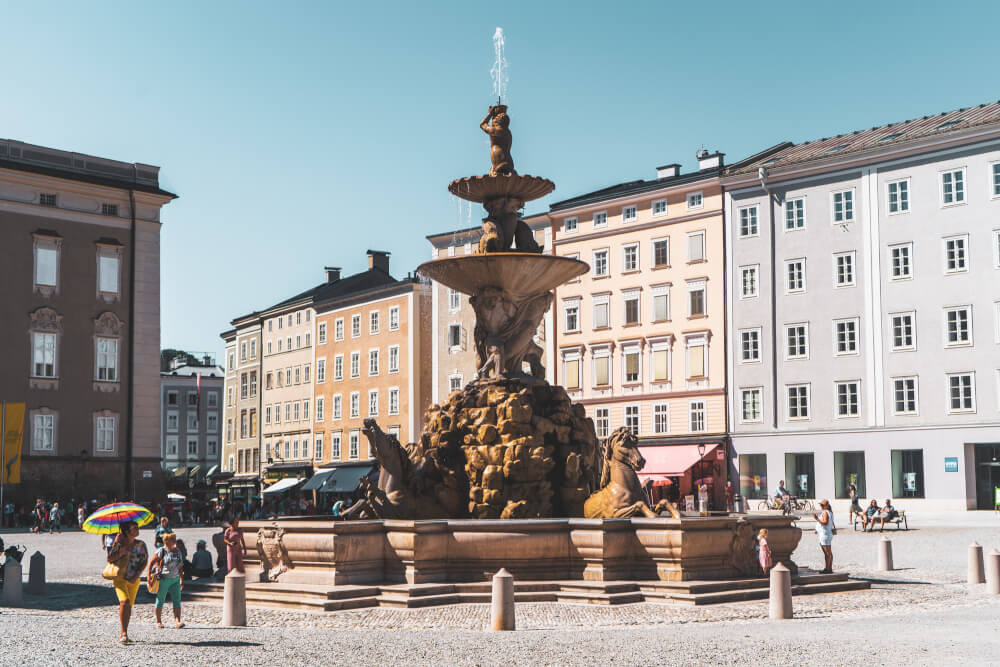
12. Remember “W” is pronounced like V
In terms of language, a good thing to remember is that the letter W in German is pronounced like a V so if you’re saying any words or names, say it with a “Vuh” sound.
In Austria, the most prominent example would be the German name of Vienna which is spelled Wien, but pronounced “Veen”.
You’ll catch this pronunciation trap in the city’s most popular dish too -Wiener Schnitzel. So remember: if you do decide to indulge in this fried slab of goodness during your trip, order it as a “Veen-uh” schnitzel and not “Weeeeee-ner” schnitzel.
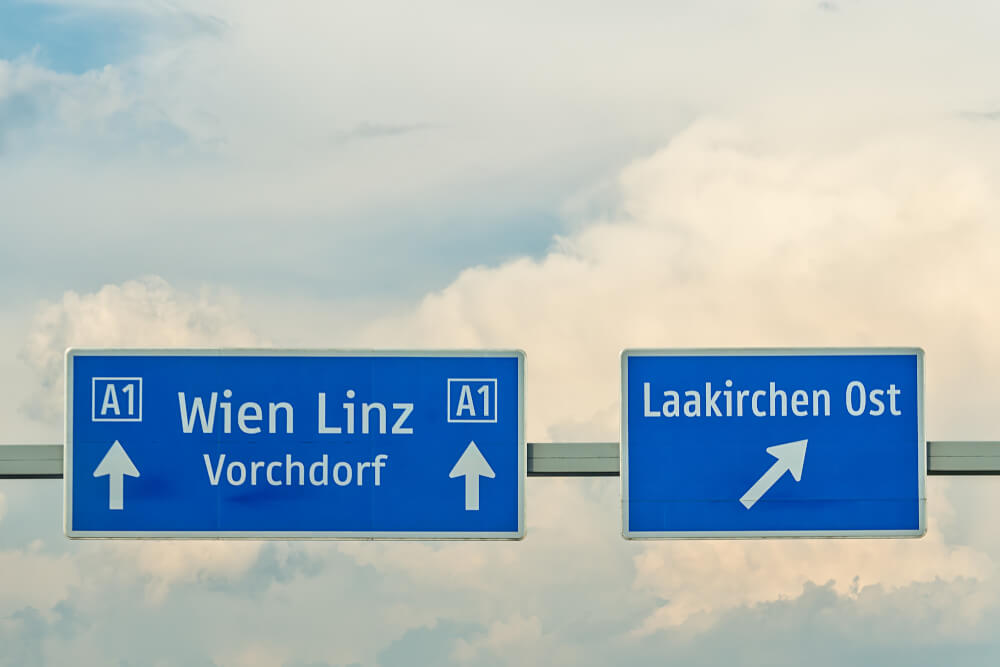
13. Avoid catching locals in photos/videos without their consent
Upon arrival in Austria, your first instinct may be to whip out your phone and capture as many of those beautiful sights as possible, to the chagrin of your 52 Instagram followers.
But just a quick note before you do that – Austrians can be very private people who don’t like having their photograph taken without consent.
So, a very important Austrian etiquette tip is to be mindful of others’ privacy and try not to blatantly take photos that might accidentally catch someone’s face head on.
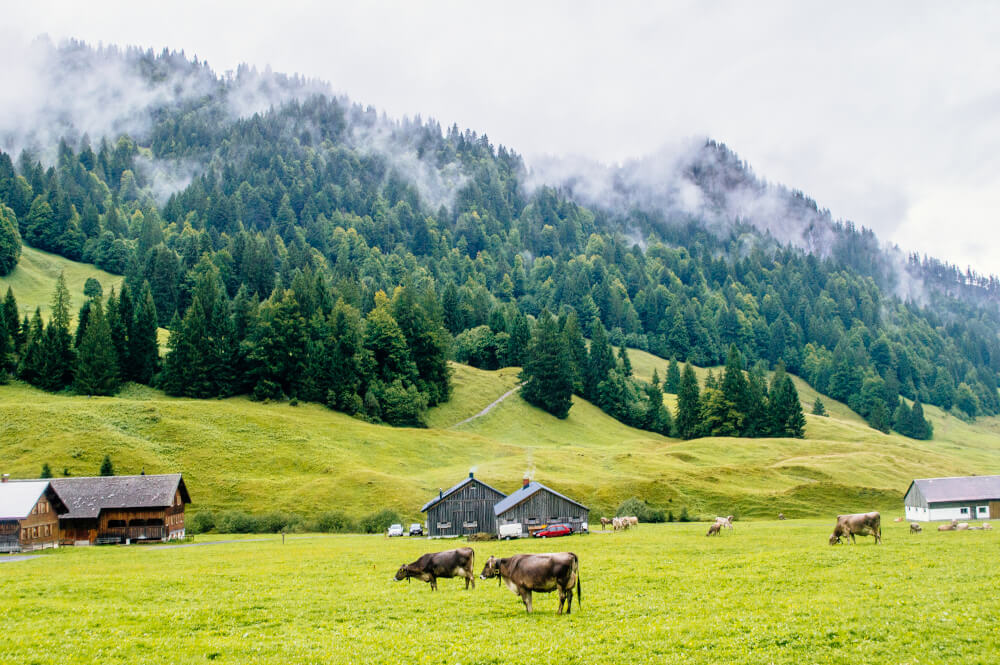
14. Don’t be alarmed if you catch people staring at you
While taking photos of others’ faces is considered very rude, one thing that isn’t is… staring.
To the shock of many first time visitors, Austrians don’t mind staring. So you could very well be sitting on the bus, minding your own business, only to feel the stony stare of a stranger who is (rather shamelessly) staring at you while you just try to peacefully exist.
Can it be jarring? Of course! But don’t worry – it’s just a cultural difference where they don’t consider staring to be a rude practice. Think of it as just them perceiving you (or if it helps your confidence, pretend it’s because you’re wowing them with your stunning face).
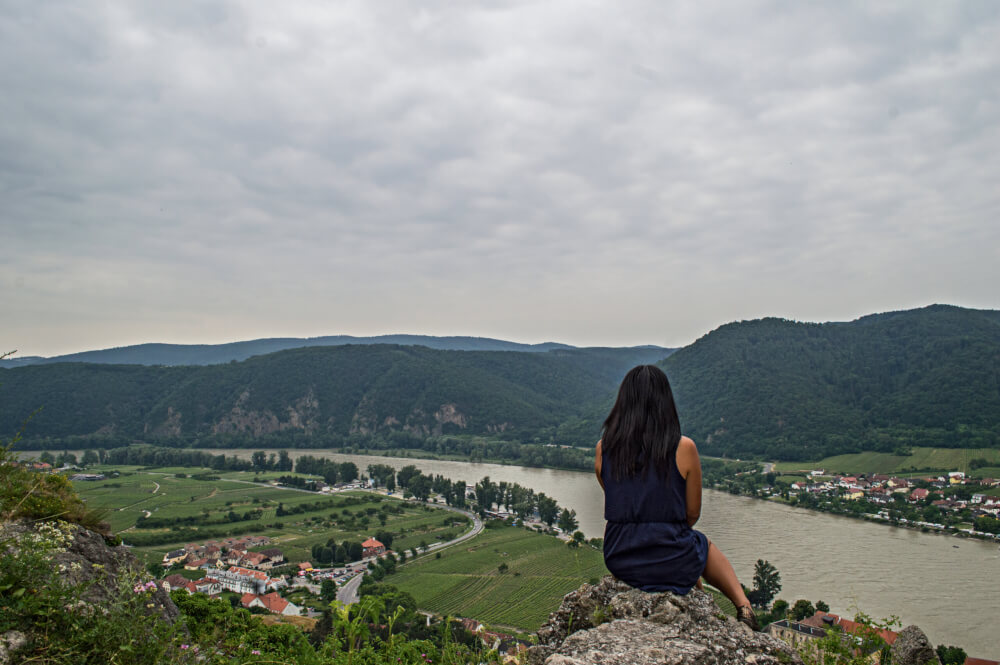
15. Learn how to tip in Austria
In terms of tips, tipping culture in Austria is definitely not as aggressive as in North America.
For good service you’ll tend to tip 5-10%, usually rounding up to a number that makes sense so if your meal was 45 euro, you might hand them 50.
What’s worth noting though is that tipping works a little differently here.
For instance, you wouldn’t just leave money on the table after the meal. Instead, you have to tell them how much you intend to pay in total (including tip) as you hand over your cash or card.
So let’s imagine that (including tip), you want to pay 40 euro. In this instance, you would say “40” as you hand over your cash or your card, and then they’ll give you the appropriate change.
If you want them to just keep the change, then you hand your cash over and say “Stimmt So!”, and they’ll know to just keep the whole thing.
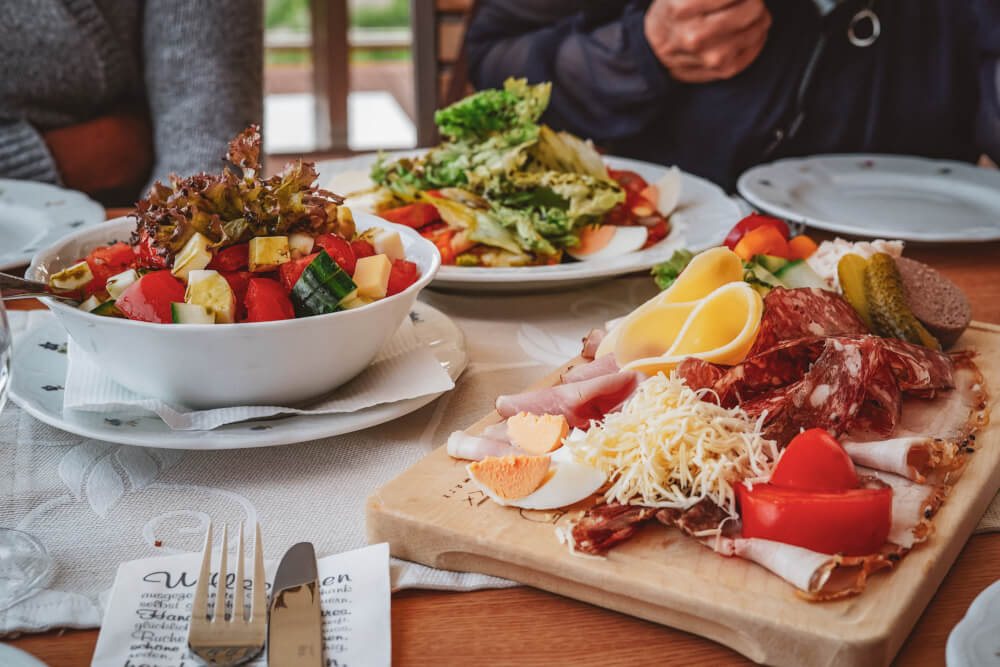
16. Be prepared for a different style of customer service
Now in terms of culture, it is often said that Austrians can seem cold and direct. I personally haven’t had this experience as much, but maybe I’ve just been lucky. (And tend to surround myself with the drunk ones ).
Anyways, what I will concede though is that Austrian customer service is very different from typical North American customer service.
In contrast to typical North American service which involves being bright, cheery, friendly and hands on, Austrian customer service is usually a lot less animated, and to someone who’s not used to it, it may even seem like you’re being ignored on purpose.
The way I’ve had this explained to me though is that Austrians just really value their privacy, hence why they take such a hands-off approach.
At a restaurant for example, the server will come, take your order and then leave you alone, hence why you need to flag them down if you want anything, because they consider constant check-ins a rude interruption.
So, don’t take ‘colder’ customer service personally – it’s just another one of those cultural differences.

17. Prepare for nude saunas and public nudity areas
Another fun cultural difference? The Austrian approach to nudity!
Namely, that they’re very into it.
If you go to a sauna in Austria for instance, it’s very much expected that you go naked (for sanitary reasons), and there’s often designated nude (FKK) zones at lakes and swimming areas as well.
Add on the fairly common occurrence of both men and women alike sunbathing topless, and you have a sure recipe for culture shock. So, if you’re from a part of the world where this kinda bare-it-all attitude isn’t common, just remember it’s normal here, so adapt accordingly.
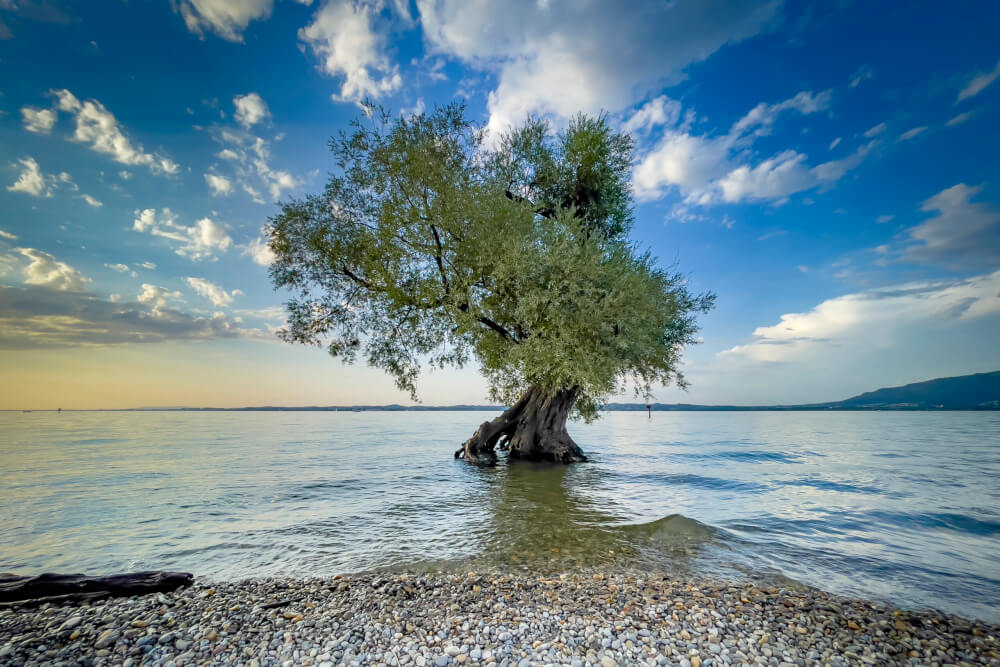
18. Eat as much dessert as humanly possible
An easier thing to adapt to perhaps is the absolutely WONDER that is Austria’s sweet scene.
Truly, Austrians are masters of dessert.
While North Americans will have no doubt heard of strudel or the famous Sacher Torte, there are SO MANY more options than those. My personal favourite is the Esterházytorte which is originally Hungarian but is commonly found in Vienna these days too, or the almighty Kaiserschmarrn, shredded pancakes served with jam or apple sauce.
With hundreds of options and special regional desserts all over, I’d recommend you simply go to a coffee house or bakery and let your senses guide you.
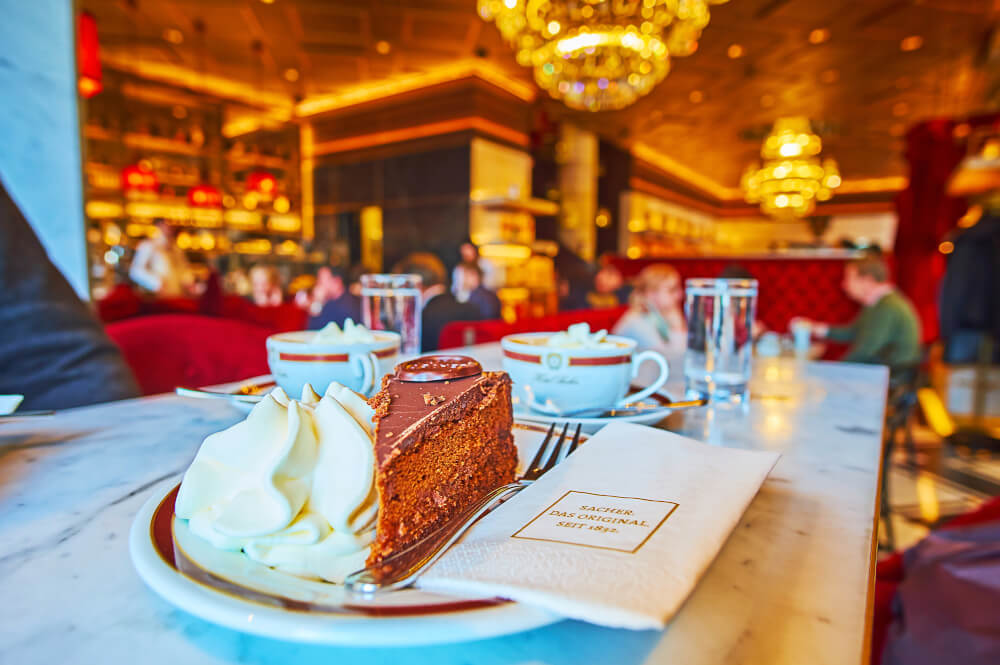
19. Try regional specialties wherever you are
While overseas visitors often think of Austrian food as simply schnitzel and not much else, the truth is there’s a lot of culinary variety across the country, so choose your eats accordingly.
For instance, Styria is known for its crispy fried chicken (Backhendl) and delicious pumpkin seed oil. Some alpine regions are also known for their hearty eats like Käsespätzle, bouncy little dumplings slathered with cheese and onions.
Other regions do a lot of fish dishes, others work miracles with potatoes – all to say be sure to try the local specialties wherever you are.

20. Don’t miss out on Austrian wine
Despite its proximity to Germany, Austria is definitely more of a wine country than a beer country, so take advantage of all the crisp and delicious wines that they have to offer.
Or better yet – book yourself a trip to a wine region to enjoy it close to the source! South Styria is one of my favourite areas of Austria.

21. Try Almdudler
And if you’re looking for a soft drink to try in Austria, make sure you grab yourself a refreshing Almdudler.
Besides being fun to say, it’s a remarkably tasty soda made with alpine herbs, and is often considered the national drink of Austria.
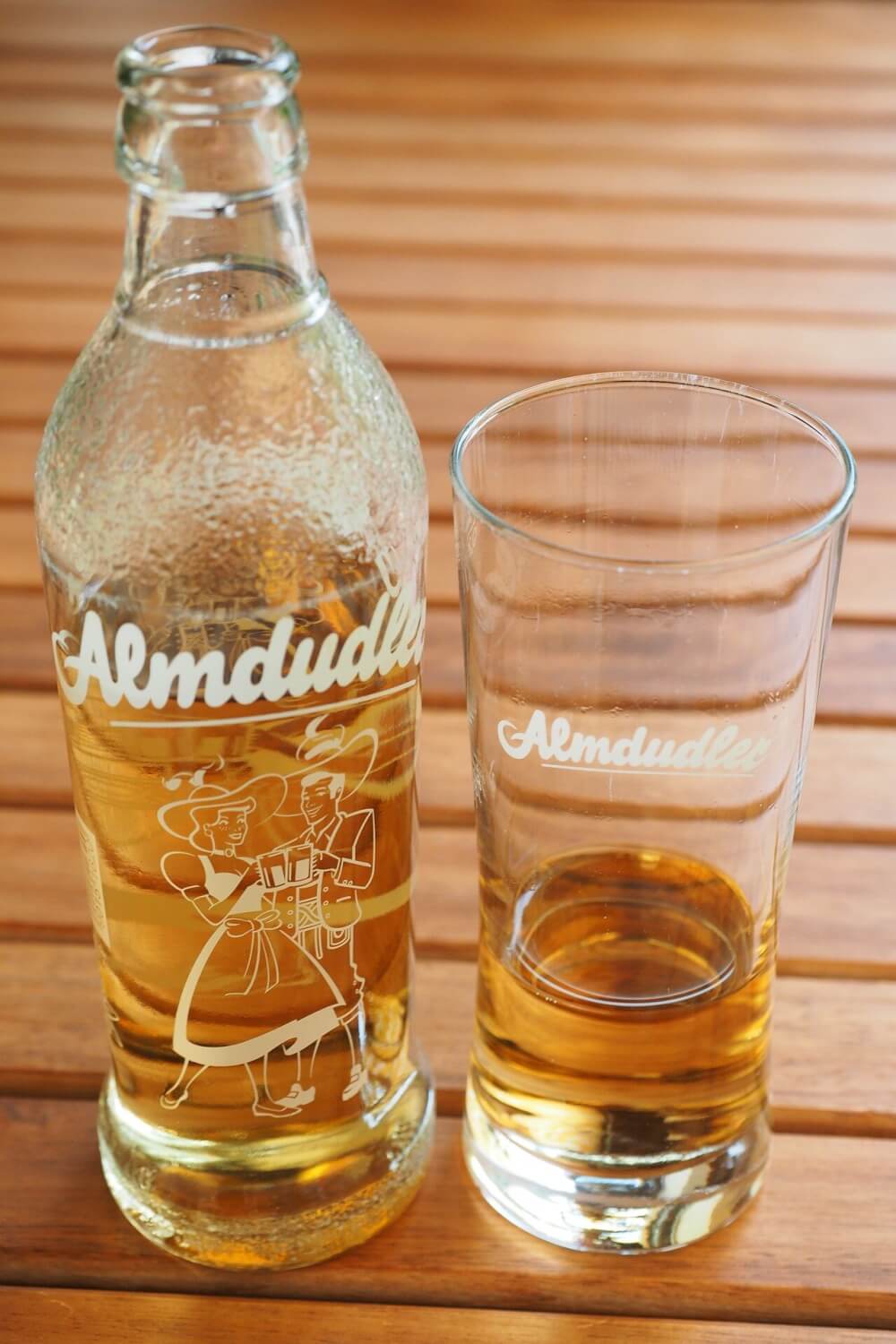
22. Don’t order schnitzel with sauce
A proper Austrian schnitzel requires little more than a quick squeeze of lemon juice. Anything more is often considered akin to sacrilege, so keep that in mind before your slather your schnitzel in mushroom sauce (which I fear to admit was actually a common thing I did in Germany).
And for my fellow Sound of Music fans, no, sadly ‘schnitzel with noodles’ is not a thing. Why is it in the song then? I imagine it’s likely because few things rhyme with “potato salad”.
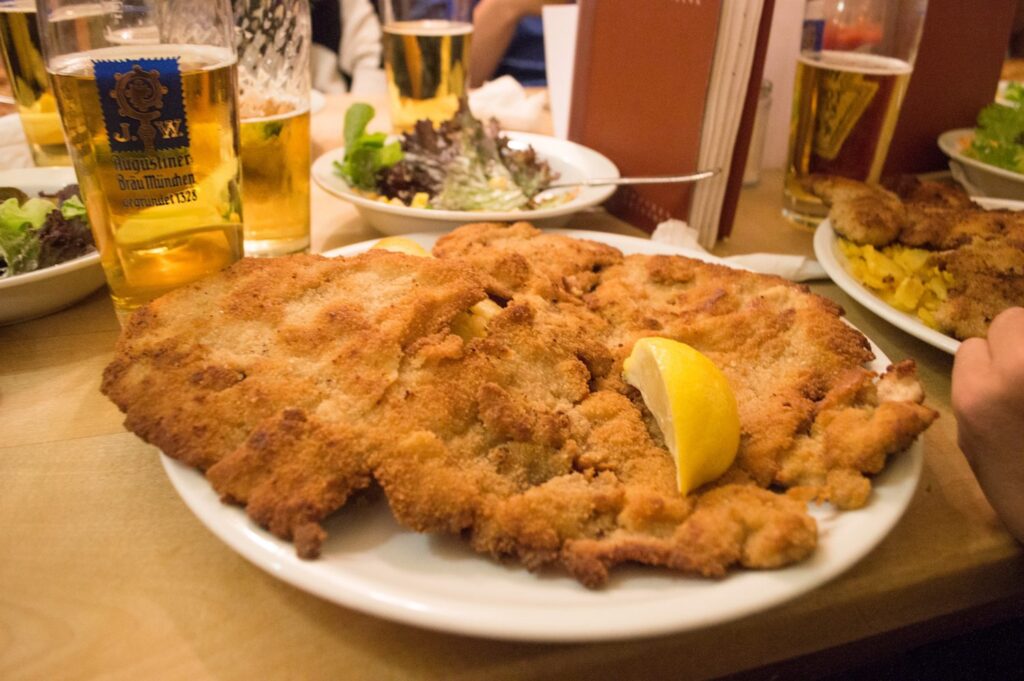
23. Bring cash
While many more places accept card payments these days in Austria, paying with cash is often still the norm, especially for smaller purchases, so having cash is always a good idea, preferably in smaller denominations like 50 euro bills or smaller.
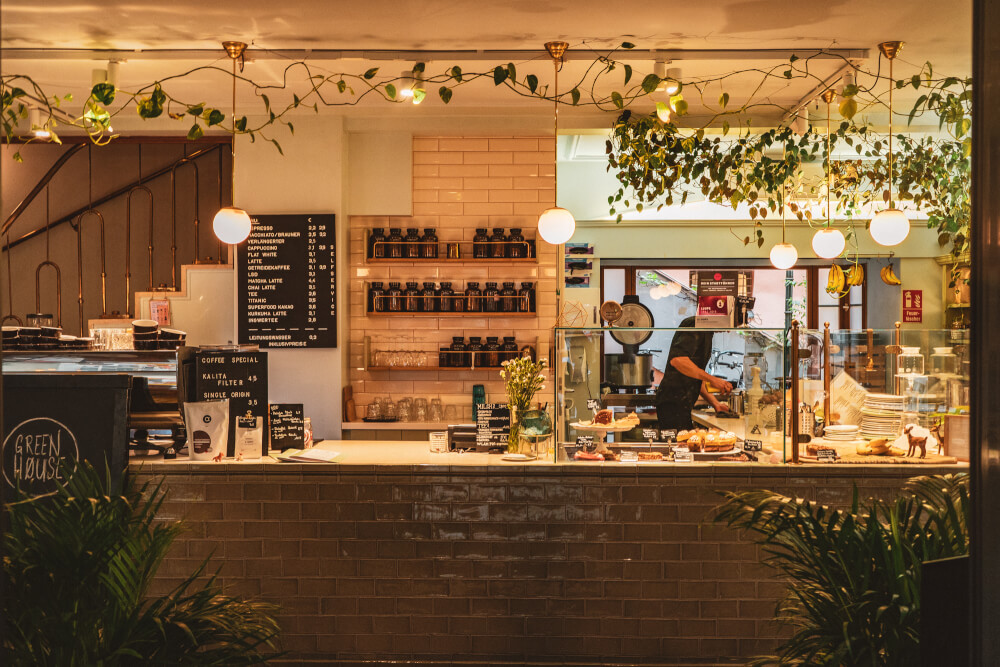
24. Prepare to pay for public bathrooms
Another important Austria travel tip is to bring coins with you wherever you go.
That’s because public bathrooms usually charge a small fee of 50 cents or a euro, so make sure you have some coins with you in case of an emergency.
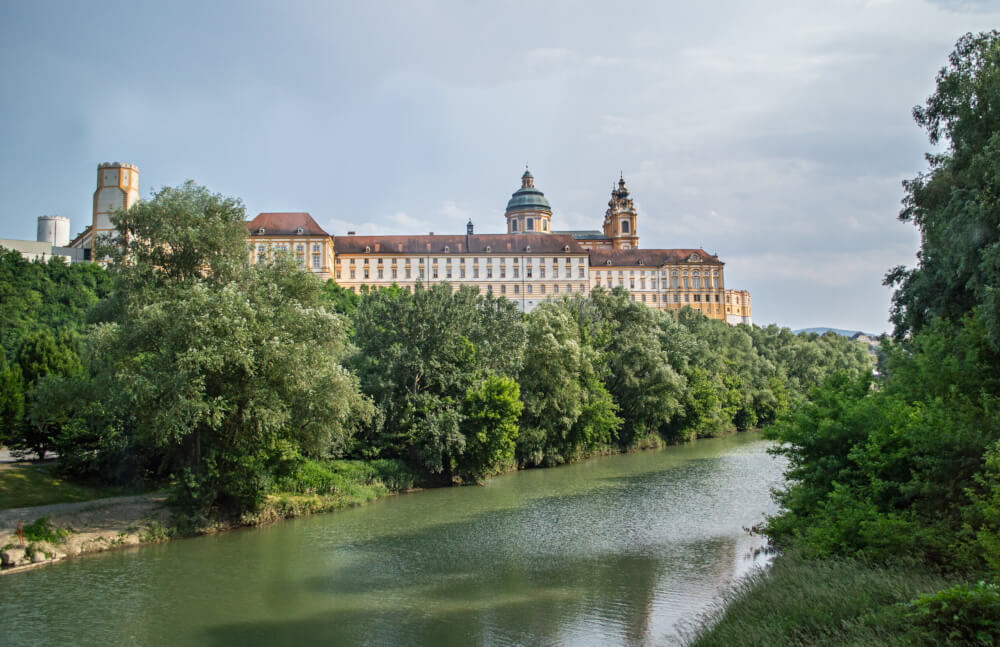
25. Do not jaywalk
In Austria, the only crime worse than saucing up your schnitzel is crossing the street when you’re not supposed to.
No – really – jaywalking is not only illegal in Austria, it’s actually enforced (albeit kind of randomly), so err on the side of caution and avoid it if possible.
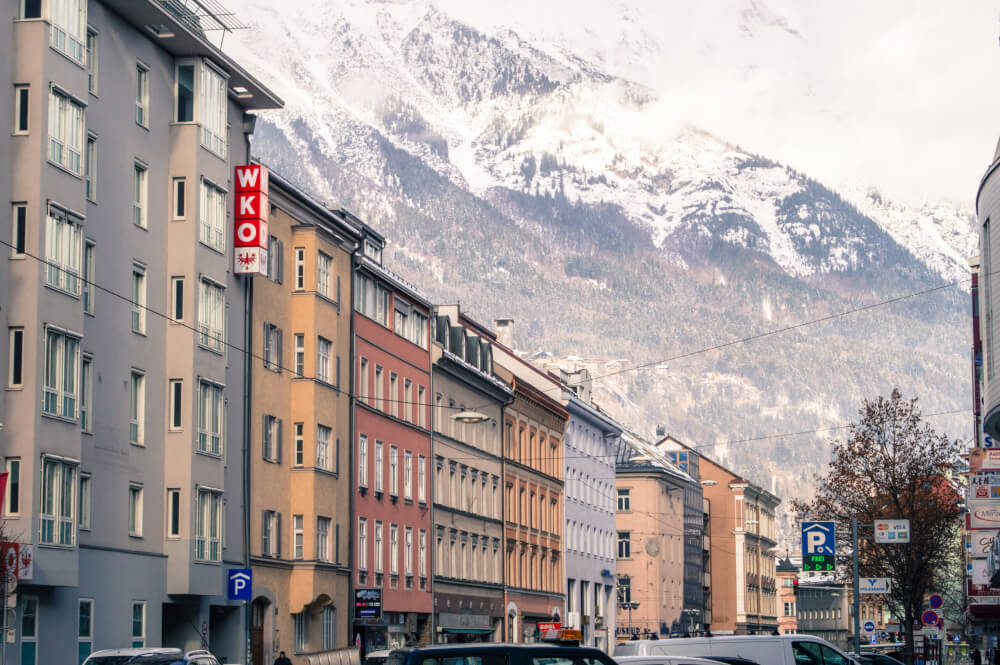
26. Remember that most shops are closed on Sundays
Last but not least, a very important Austria travel tip if your visit coincides with a Sunday is that Sundays are considered a day of rest in Austria so shops (including grocery stores) are closed.
That said, be sure to stock up on any shopping before Sunday, although in a pinch, bakeries, restaurants, gas stations and shops in transit hubs will usually still be open.
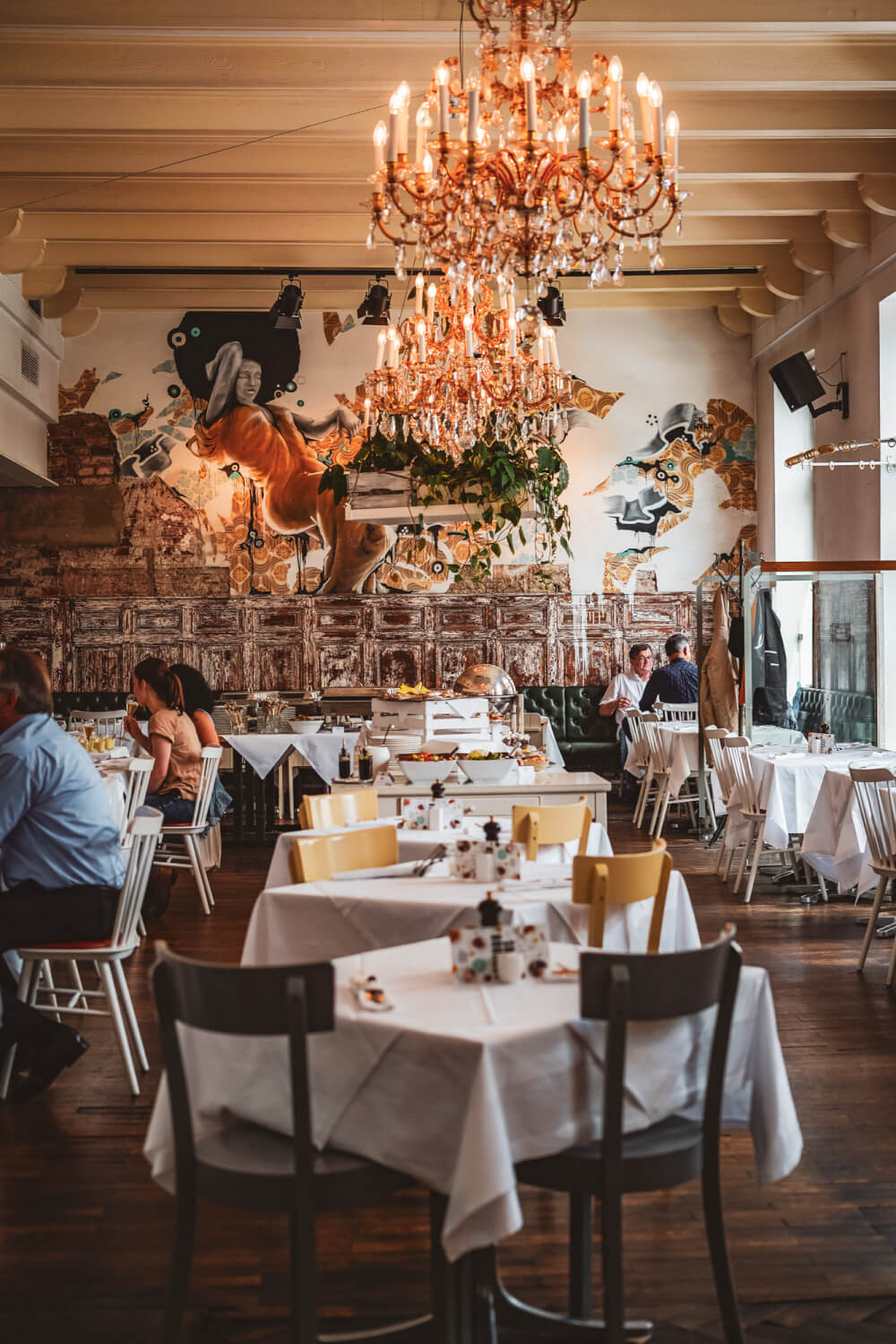
I hope this list of Austria travel tips was helpful!
If you’re here after all those Austrian travel tips, congrats – I’m beyond proud of you! Hopefully by now, you’ll feel much more prepared for your big Austria trip, but if you have any more questions, let me know in the comments.
My Go-To Travel Favourites:
🧳 Eagle Creek: My favourite packing cubes
💳 Wise: For FREE travel friendly credit cards
🍯 Airalo: My go-to eSIM
🏨 Booking.com: For searching hotels
📷 Sony A7IV: My (amazing) camera
✈️ Google Flights : For finding flight deals
🌎 WorldNomads: For travel insurance
🎉 GetYourGuide: For booking activities
Leave a Comment Cancel reply
By using this form you agree with the storage and handling of your data by this website. *
Which Language Do You Want to Learn?
- Inside Babbel
- Babbel Bytes
ARTICLES ABOUT
9 essential austrian german words for a night out in vienna.

Vienna. It’s been on your bucket list for a while now. With its immaculate architecture, picturesque parks and rich musical tradition, it’s bound to satisfy even the hardest-to-impress tourist (which, in fact, you are).
After months of planning and saving (and paying down some seriously overdue student loans), you and some friends — we’ll call them Brenda and Brandon Walsh — have finally arrived in the City of Music and Dreams (City of Music for that Mozart guy, City of Dreams for that Freud guy).
Today, you stood in awe at Schönbrunn Palace , absorbed some culture in the Museumsquartier and marveled at the utility of the Ringsstraße . Now that you’ve seen the sights, you and the Walsh twins are ready for a night out on the town.
Brenda’s dying to go clubbing, Brandon’s looking for something a bit more low key and you’re down for pretty much whatever; despite the group dissonance, you’re all in agreement about one thing: after a touristy kind of day, you’re looking for a more authentic Viennese experience (and no, I don’t mean yodeling, though that could be fun).
To discover the real Vienna, the Vienna beneath the surface, just do as the Romans Viennese do: speak the words and phrases of the locals.
Here are the 9 essential Viennese words you need to survive a night out in the glorious Austrian capital:

Dessert before dinner? That’s crazy! But why not? — you’re on vacation. Throwing caution to the wind, you decide on the most famous and decadent of Austrian desserts: the strudel. With its doughy flakey goodness and sweet and fruity inside, it’s hard to resist (and even harder to digest).
As a noun, strudel means “whirlpool” or “vortex.” Make it a verb, and now you’re “swirling.” Add the common German prefix “ab,” and you’ve got abstrudeln , meaning “to struggle.” Put it all together, and if you strudel anymore, you’ll be abstrudeln to keep your strudel down.

Dessert was great and all, but Brandon’s still grappling with some serious hunger — what the Viennese might call having a real Flamo . Looks like it’s time for some good ol’ Grammelschmalz (crackling fat) and Saumaise (salted meatloaf). Luckily for you, Brenda’s already yelped a super traditional restaurant with like a billion stars. Onward!

You’ve just been seated in one of the quaintest little restaurants, when, without so much as a smile, your server Hans dumps the end piece of a loaf of bread on your table. Brandon’s like, “What?” Brenda’s like, “Huh,” and you’re like, “Zo?” But don’t insult Hans by scoffing at this tiding; it’s actually the much revered Scherzl , the first or last piece of bread from the loaf, and something that should be savored in all its edge-of-bread glory. And don’t worry — the main course is still to come.

A Bankl reißen
“Uhhhh,” says Brenda, struggling to breath. “Mughh,” says Brandon, rubbing his tummy. Between the strudel appetizer, the Scherzl , the plum dumplings and a Wienerschnitzel the size of your head, you’re all stuffed to the gills. In Viennese German, you might just be ready to a Bankl reißen , literally “to tear a bench” (as in, “my a** might just break that bench with all those carbs I ate”); or, figuratively “to die” (as in, “I’m so full I’m going to die”).

What a delicious meal! You’re so pleased, in fact, you ask to personally congratulate the chef on a job well done. In your best beginner’s German, you proclaim, “ Sie haben so schön gekackt! ”
Unfortunately, and despite your best intentions, you just told the chef that he did a really good job… making a number 2. In German, the verb kochen (kock-en), meaning “to cook,” is far too close for comfort to the verb kacken (kahk-en), meaning… well… the opposite of eating.
Yeah, embarrassing.
No one needs to be complimented on their “kacken,” least of all the chef who just prepared your meal. In Vienna, your error would surely be nedlich , the best word for describing a verbal faux pas. Don’t worry though — you’re not the first to make this mistake (and you certainly won’t be the last!).

Zwutschkerl
After that unfortunate nedlich incident at the restaurant, you’re feeling a bit like a Zwutschkerl , a real idiot (as in, not the sharpest knife in the drawer… or is it shed?). But things are looking up — you’re headed towards the Prater for a nice post-digestion (and post-humiliation) stroll. The Prater, with its carnival rides and potential for debauchery, is also the perfect place — according to Brenda — to spot some real Augenweide (eye-candy).
In fact, before you know it, Brandon’s flirting with some girl next to the Wiener Riesenrad, and Brenda’s just gotten you all invited to a real Viennese party! Sweet!

Kurvn krotzen
Wow, this party has a little bit of everything — jello shots, beanie babies, that guy that keeps telling every girl they remind him of his mother — everything! You’re having a really lovely time (and even discussing Freud with a girl in a cow costume), but now Brenda’s being stalked by some guy who complimented the shape of her eyeballs, and some woman is telling Brandon that she’s super ready to get married, and what is he doing later, and how long is he staying in Vienna for, and what are his plans for the future, and could he imagine a future together?!
Being the knight in shining armor that you are (make that dashing knight in shining armor), you act quickly, quietly signaling to your friends that it’s okay, help is just around the corner. With obstacles and landmines on all sides, it seems the best way out of there is to Kurvn krotzen , or to sneak out quietly without anyone being the wiser.

You’ve hardly made it to the sidewalk, when Brenda and Brandon start screaming, “Heisl!” Heisl!” Having just learned the word at the party from someone dressed as a peacock, you’re a bit confused; doesn’t Heisl mean “a lonely and unloved person?” Are they talking about you? They’re talking about you, aren’t they?! And why, of all times, are they choosing this moment to point out that you’re alone and unloved?!
Easy, tiger. Turns out Heisl has more than one meaning (three in fact), and naturally each of you has learned the word from a different party guest. So while Brenda is doing the pee-pee dance, begging for the Heisl (bathroom), Brandon wants nothing more than to go Heisl (home); meanwhile, you’re standing there utterly perplexed by your friends’ incessant reference to a lonely and dejected individual.
After what seems like an hour yelling different meanings of Heisl at one another, you finally remember that you all speak English, clarify your needs and head for the hotel.

Reparaturseidl
It’s morning in Vienna. The birds sing sweetly as the the sun, hanging low and heavy on the horizon, casts its warm glow through your hotel window. Sleepily, and with love in your heart, for good friends and for all this beautiful world has to offer, you turn your gaze to the window and shout, “Shut up, Bird! I have the worst hangover ever!”
“Shut the curtain!” screeches Brandon, waking from his slumber on the floor next to you. “It’s too bright!”
Head pounding, you close the curtains only to realize that the bed next to you is empty, and Brenda is nowhere to be found. Panicked, you scour the hotel room and eventually find 1/2 of the Walsh twins asleep in the bathtub. You ever so gently try and rouse her awake, only to be met with a guttural, “Ughhhhhhhhhhhhh.”
In times likes these, there’s really only one solution: the Reparaturseidl , literally “repair beer.” So, being the born leader that you are (your 4th grade teacher told you so), you call room service, lie down and wait.
An hour later, and post- Reparaturseidl , you’re sitting on your hotel terrace (you have a terrace now), and this time really with love in your heart, for good friends and for all this beautiful world has to offer, you look out over the city and think, “So this is Vienna. I like.”

- General information
- Plan your trip
Language in Vienna
What is the official language in Vienna? Do they speak English in Austria? How do I order food in restaurants?
T he offical language of Vienna is German. English is understood in many places, so don't worry too much about not speaking German, however you might find that some restaurants only have German language menus and German speaking waiters.
As becoming fluent in German for your trip might prove a little too challenging, why not print out our helpful list of basic phrases and expressions to try out on your travels?
Greetings in German
At the restaurant, days of the week, other useful expressions, you may also be interested in, travel advice.
What travel documentation is needed to go to Vienna? Find out what you need to enter Austria depending on your nationality and whether you need a visa.
Are Vienna's restaurants expensive? How much does a coffee cost? How much money should you bring for a few days in Vienna?

Beginner Austrian Guide - A Comprehensive Guide
Austria is a beautiful country in Central Europe, known for its stunning landscapes, rich history, and vibrant culture. If you are planning to visit Austria or simply interested in learning the language, mastering the basics of Austrian German will be a great place to start. In this article, we will provide you with an overview of the beginner Austrian basics, including the alphabet, common phrases, and grammar rules.
The Alphabet
Common phrases, grammar basics, useful vocabulary, language learning resources.
The Austrian German language uses the Latin alphabet, just like English. However, there are a few letters that are unique to the German language, and you should familiarize yourself with them. Here are the 26 letters of the Austrian German alphabet:
A, B, C, D, E, F, G, H, I, J, K, L, M, N, O, P, Q, R, S, T, U, V, W, X, Y, Z.
In addition to these letters, there are four special characters that are also used in the German language: ä, ö, ü, and ß. These characters are known as umlauts and the “ß” is called the “Eszett” or “scharfes S” in German.
Learning some common phrases is a great way to start your journey into Austrian German. Here are a few useful phrases that you can use in everyday conversation:
Guten Morgen! (Goo-ten mohr-gen) - Good morning! Wie geht es Ihnen? (Vee gate es een-en) - How are you? Mir geht es gut, danke. (Meer gate es goot, dan-keh) - I’m doing well, thank you. Wie heißt du? (Vee hyst doo?) - What’s your name? Ich heiße… (Ich hys-seh) - My name is… Ich verstehe nicht. (Ich fer-shtay-eh nikht) - I don’t understand. Entschuldigung (Ent-shool-dih-gung) - Excuse me/sorry Danke (Dahn-keh) - Thank you Bitte (Bit-teh) - Please/you’re welcome Auf Wiedersehen! (Owf vee-der-zay-en) - Goodbye!
These phrases are useful for basic communication in Austrian German. However, keep in mind that the Austrian dialect of German differs slightly from standard German, so you may hear variations of these phrases depending on the region you are in.
German grammar can be complex, but it is important to have a basic understanding of the language’s grammar rules to form sentences correctly. Here are a few basic rules to keep in mind:
Nouns: In German, all nouns have a gender, either masculine, feminine or neuter. There are no set rules for determining the gender of a noun, so you must learn it with the noun itself. Nouns also have different forms for singular and plural.
Verbs: Verbs in German change depending on the tense, mood, and subject. There are six tenses in German (present, perfect, past, pluperfect, future, and future perfect) and three moods (indicative, imperative, and subjunctive).
Adjectives: Adjectives in German also have gender and number agreement with the nouns they modify. The ending of the adjective will change depending on the gender and number of the noun.
Word Order: In German, the word order is subject-verb-object (SVO) for declarative sentences, but it can be different for questions and other types of sentences. The word order can also be changed for emphasis or to create different sentence structures.
As you continue to learn the language, you will become more comfortable withthese grammar rules and learn more complex concepts such as cases, prepositions, and conjunctions.
Expanding your vocabulary is an essential part of learning any language. Here are some useful words and phrases to add to your Austrian German vocabulary:
Familie - Family Freunde - Friends Essen - Food Trinken - Drink Haus - House Stadt - City Land - Country Geld - Money Arbeit - Work Schule - School Auto - Car Flugzeug - Airplane Bahnhof - Train station Krankenhaus - Hospital Urlaub - Vacation Musik - Music Film - Movie Buch - Book
These words will be useful in basic conversation and can help you navigate your way around Austria.
There are many resources available to help you learn Austrian German. Here are a few options to consider:
Language Courses: You can take language courses at language schools, universities, or online platforms. These courses typically offer structured lessons and are taught by experienced instructors.
Language Learning Apps: There are many language learning apps available such as Duolingo, Babbel, and Rosetta Stone. These apps offer interactive lessons and quizzes to help you learn at your own pace.
Language Exchange Programs: Language exchange programs allow you to practice speaking with native speakers of the language. Websites such as Tandem and HelloTalk connect language learners around the world.
Books and Media: Reading books and watching TV shows and movies in Austrian German can help you improve your comprehension and vocabulary. You can also listen to Austrian German music or podcasts to practice your listening skills.
Learning Austrian German can be a rewarding experience that will enhance your travel experiences, open up job opportunities, and allow you to communicate with locals. While the language can be challenging, mastering the basics will help you build a strong foundation for future learning. By practicing regularly and using a variety of resources, you can develop your skills and become confident in your ability to speak Austrian German.
Achieve fluency with ListLang—it's free!
Welcome to the Holiday Information Service
Our holiday experts are here to assist you with your holiday planning. Send us a message and we will get back you as soon as we can.
Please fill in fields marked with *
Give us a call Monday to Friday from 8am to noon. Outside of our office hours please drop us an email and we'll be happy to answer your questions.
Telephone: 00800 400 200 00 Österreich Werbung Vordere Zollamtsstraße 13 A-1030 Wien Wien AT
*toll-free; calls from mobile networks may incur charges
We would like to show you content from external sources here. Unfortunately, you have not given us permission to do so. As soon as you load the content, you agree to the use of cookies for statistical and marketing purposes. You can change or withdraw your consent at any time via the ( data protection statement ). Load content See on Launch campaign Lebensgefühl Österreich - Subject for Austria Info Austrian National Tourist Office / Marko Mestrovic media_content.tooltip.skipped
We would like to show you content from external sources here. Unfortunately, you have not given us permission to do so. As soon as you load the content, you agree to the use of cookies for statistical and marketing purposes. You can change or withdraw your consent at any time via the ( data protection statement ). Load content See on Launchkampagne Lebensgefühl Österreich Austrian National Tourist Office / Marko Mestrovic media_content.tooltip.skipped
We would like to show you content from external sources here. Unfortunately, you have not given us permission to do so. As soon as you load the content, you agree to the use of cookies for statistical and marketing purposes. You can change or withdraw your consent at any time via the ( data protection statement ). Load content See on Launchkampagne Lebensgefühl Österreich - Sujet für Austria Info unter Wasser Desktop Austrian National Tourist Office / Marko Mestrovic media_content.tooltip.skipped
We would like to show you content from external sources here. Unfortunately, you have not given us permission to do so. As soon as you load the content, you agree to the use of cookies for statistical and marketing purposes. You can change or withdraw your consent at any time via the ( data protection statement ). Load content See on Launchkampagne Lebensgefühl Österreich - Sujet für Austria Info unter Wasser Mobil Austrian National Tourist Office / Marko Mestrovic media_content.tooltip.skipped
Austria – Lebensgefühl. Experience the Joy of Life in The Heart of Europe
Feel the ease, the serenity, the love for great food and art and culture, the charming wit, the welcoming atmosphere – feel the Austrian Lebensgefühl
Discover the Entire Country
Discover austria.
Explore Austria at its best with these concise itineraries. Whether it's iconic landmarks or hidden gems, culinary delights or art and culture, discover how to make the most out of your stay.
Vienna in 3 Days
Salzburg in 48 hours, innsbruck in 3 days, graz in 3 days, our hotel reccomendations, austria hotel collection.
Looking for a charming family-run hotel, a luxury spa resort, or a cosy private apartment? Here is our curated list featuring great hotels in Austria's cities and on the countryside.
A Summer in Austria - Your Daily Dose of 'Lebensgefühl'
Nature, mountains and lakes, cultural treasures and thousands of moments of indulgence are the setting for a very special attitude you'll experience during a summer holiday in Austria: A light-hearted feeling, that comes to life beautifully when connecting to the locals.
Lebensgefühl Austria - hiking with the family Austrian National Tourist Office / Marko Mestrovic media_content.tooltip.skipped
A Holiday in Austria puts a Smile on your Face
An experience, an encounter, sometimes just a moment - and the new somehow feels familiar. In Austria, this atmosphere is literally in the air: A sensation that, in nature, feels light and free, full of fun and joie de vivre. A feeling that, while connecting with the people who live here, feels genuine.
Mountains, water, energetic places, cultural treasures - that is Austria for you. As well as cooling off in a crystal-clear lake, the gratifying feeling when conquering a summit, and a snack at a mountain hut. Austria is the freedom of an open-air festival, and the cosiness of a wine tavern. All places and moments, that make it easy to clear your head, to be amazed, to feel the vitality. The spark is quickly ignited. Anyone who is a guest here becomes part of this very special attitude to life.
Experience Austria's Nature
These boots are made for walking, the most beautiful swimming lakes, i want to ride my bicycle, we are family, hiking with children.
Exploring mosses, watching butterflies, feeding goats ... Children are curious. Austria's hiking routes are just right for an unforgettable hiking day.
Moments of Cultural Pleasure
Museums and galleries, embrace austria's guilty pleasures, wine culture in austria, culinary pit-stops in austria, which summer activity do you fancy, walking and hiking in austria, cycling and biking in austria, lakes and nature in austria, trailrunning: a wonderful family experience, discover city life, city breaks in summer - your cultural 'lebensgefühl'.
City trips in Austrias cultural summer hit right at the heart. Because Austrias cities surprise, make curious – and sometimes even are addictive. #feelAustria
Austria is a country rich with history, beautiful regions, imperial cities and year long activities.
In Harmony with Austria
When you spend your holiday in Austria, you will experience that one moment – the moment that you’ll remember for years to come, the moment you’ll return to in your head when life gets stressful.
Active in the Outdoors
It's the small moments that make us happy: The pride on our best friend's face when finally reaching the summit. Or at night, falling asleep with achy legs but a smile on our face. That's what life in the outdoors is all about.
Wellbeing & Relaxation in Austria's Nature
Nature soothes our minds and bodies. From the healing effect of waterfalls and trees to the beauty of cultural landscapes, mountains, and waters, Austria is filled with natural gems.
Why Forest Bathing Can Make You Healthier and Happier, According to Science
Why spas and thermal baths are so good for us, culinary discovery trip through austria.
Austria owes its culinary identity to both its location in the heart of Europe and its remarkable history. Austria stands for openness to varied influences and a love for refining existing traditions at the highest level.
9 restaurants and mountain huts with a view
Dream career: organic farmer, austrian culture, artists & masterpieces.
Let us dive into Austria’s arts and culture sphere and discover fascinating stories of the masters and personae that led the way.
Hedy Lamarr, Hollywood Goddess and Lady Bluetooth
Gustav klimt loved art, women and lake attersee, our hotel recommendations, find a city hotel, find an alpine stay, share feedback for a chance to win a special holiday experience.
We value your feedback! Take part in our brief survey to be in with the chance of winning one of five very special holiday experiences in Austria. Click here to take part.
It goes without saying that your data is processed with complete anonymity. Read the terms and conditions here.
Insiders' Tips
Austria’s prettiest places, according to austrians, austria's quirkiest city tours, top 5 austrian dishes you need to try, austria’s top sights, events in austria, practical travel information, about austria, brexit and travelling to austria, how to get to and around austria, what are you interested in, family fun in austria, round trips in austria, cities and culture in austria, skiing and winter in austria, austrian cultural stories, famous austrians.
From Mozart and Sisi to Hedy Lamarr – Austria's sons and daughters have left their mark across music, art, science, politics, and sport. Find out which famous personalities originate from or lived in Austria and follow in their footsteps.
Passport & Visa for Austria
Vienna pass: your personal key to the city, travel experiences designed by experts, austrian – the charming way to fly.
Enjoy Austrian hospitality and multi-awarded service already on board, with Austrian Airlines from 130 cities around the world direct to Vienna and other Austrian cities.
Explore Austria By Train
Travelling through Austria by train is reliable, comfortable, and convenient. Relax, sit back, and enjoy your vacation, the Austrian Railways takes you to Austria’s most beautiful places.
Have a Taste of Austria
[{ "@context": "http://schema.org/", "@type": "imageobject", "url": "/static/img/icon/recipe.png", "contenturl": "/static/img/icon/recipe.png", "caption": "favourite austrian recipes", "isfamilyfriendly": true }] favourite austrian recipes.
Craving a taste of Austria? Why not don your apron and recreate your favourite regional specialities at home? Here is a list of some of Austria's most delicious all-time classics.
Explore Austria
Plan your trip to austria: best of austria tourism.
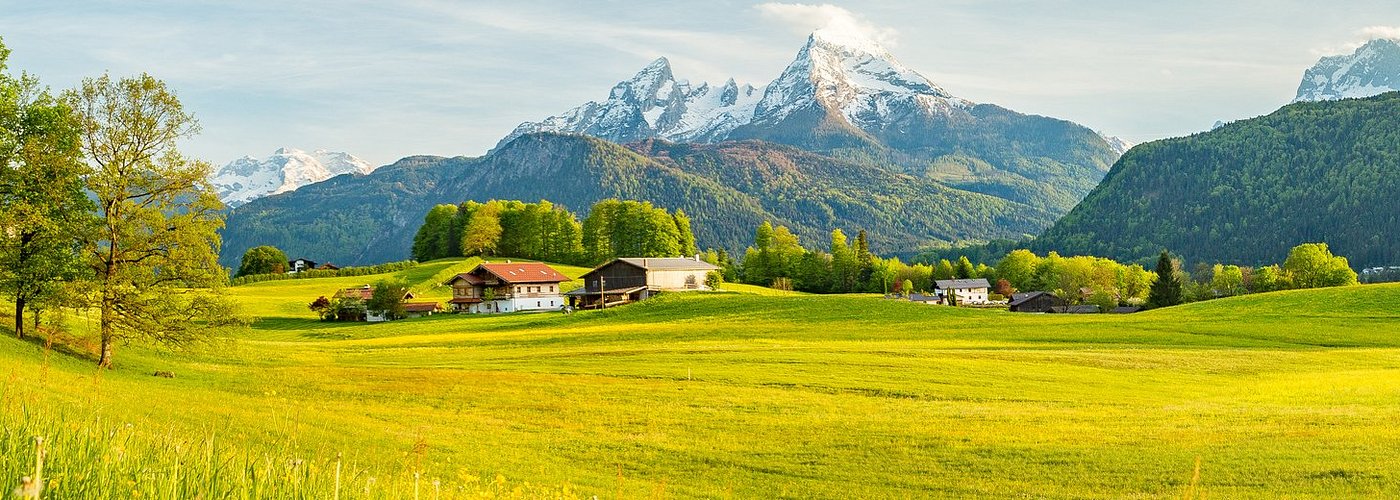
Essential Austria

Trending in the forums

Austria Is Great For
Eat & drink.

High-octane

30+ common Italian phrases for your trip to Italy
There's no better way to level up your trip to Italy than by practicing your Italian! Learning a few key phrases will help you feel more confident ordering in an Italian gelateria (gelato shop) and chatting with locals over an espresso and colazione (breakfast).
Here are the most important phrases you'll need in Italy!

Italian 101
You don't have to be fluent to have fun with Italian. You're on vacation, so don't stress! Enjoy using the Italian you know and see what else you learn along the way. (And you might be pleasantly surprised that even beginners can have real conversations !)
It's the effort that counts. Using some Italian shows locals that you're interested in their culture and community .
Study smart, not hard. Focus on the most useful Italian words and phrases , and worry less about getting every grammar detail right. A few key words go a long way!
Asking for help
Getting around town, ordering food.

Local language
Buon giorno! It's considered polite to greet people with "good morning" or "good afternoon" when you enter stores, cafés, or souvenir shops.
Soften those "k" sounds. In Tuscany, many "k" sounds are pronounced like "h"—so order a Coca Cola by asking for a Hoha Hola!
The beginning of your journey with Italian 🇮🇹
These basics will get you far in Italy, but there's a lot more Italian where that came from. To make real connections during your trip, let Duolingo be your guide! Our bite-sized lessons make it easy to fit study time into your busy schedule, and our entire Italian course is free—so you can save your euros for souvenirs.
Related Posts All Posts
8 phrases you need in japanese convenience stores, 30+ common french phrases for your trip to france.

IMAGES
VIDEO
COMMENTS
Learn 39 Austrian German phrases that will help you sound like a local, whether you want to say hello or cure your hangover! This fun list includes unique greetings, food-related phrases and miscellaneous slang from Austria. ... Austrian German Phrases and Slang. A German travel phrasebook is a helpful tool on your trip to Austria—most times ...
In Austrian phrases, spiders (or Spinnen) are referenced figuratively in order to invoke annoyance and irritation. This phrase is essentially the Austrian equivalent of saying "I think I'm going crazy". Augenweide. Austria is full of beautiful, well-dressed locals, so you might want to keep this phrase in your back pocket. It means eye-candy.
Austrians also know English quite well, as it is taught in every school as a second language. When traveling to Austria, you will definitely need a German phrasebook.The most popular and useful phrases in German are as follows: Guten Tag. Goodbye. Auf Wiedersehen.
50 Austrian Words and Phrases you should know before you VISIT AUSTRIA#austria #learngerman #visitaustria Welcome to the Austrian German Tutorial. In this vi...
20 Common Austrian German Words. 1. Grüß Gott / Servus / Griaß di. Meaning: hello. Hallo and Guten Tag are becoming more common in Austria every year, but if you want to make a good impression on the older generation, you should try the Catholic-inspired Grüß Gott — literally "God's greeting.".
The most common way to say goodbye in Austria is to exclaim in a most cheerful way these two words. They simply translate to kisses, bye. Adorable, we know. Schau ma Mal. Hugely dependent on context and interpretation, this phrase has a life of its own.
Our country travel guide such as the Austria travel guide is divided into convenient sections, such as a country overview, followed by what you can see and do as you tour Austria, as well as a section providing some basic German words and phrases to help you get around. This way, you can haggle for better prices as you shop or you can ask for ...
Language resources. Culture. Austrian greetings: Tradition, slang, and ways to say goodbye. by Sandra Köktas. Published on July 18, 2022 / Updated on January 5, 2024. Facebook. Post. Making friends with Austrian greetings: 4 ways to say hello in Austrian slang, some long goodbyes and season greatings.
Learn common words and phrases in Austrian, from greetings to essential questions, to enhance your travel experience with J² adventures. ... want to join a featured trip, or simply want to explore, drop us a note. We work really hard to be a loved travel company that delivers amazing and memorable experiences. So please do not be surprised ...
Schmäh führen. Schmäh means 'trick', 'joke' or 'fib' in Austrian German and is also used to describe Viennese humour, which is very specific to the city and has a reputation for being particularly sarcastic and morbid. Schmäh führen, a very common phrase in Austria that is pretty much unknown in Germany, can be best translated ...
Planning a trip to Austria? Whether you're dreaming of exploring Vienna's imperial palaces, skiing in the Alps, or indulging in the country's famous coffee culture, there's one thing that can make your experience even more authentic: speaking the local language. And don't worry, you don't need to be fluent. Learning just a few key phrases can go a long way. Imagine ordering your coffee in German,
Well, courtesy and politeness are a valuable asset in any language. The basics should include "please," "excuse me," " sorry ," "thank you," and "you're welcome." But that's not all. Below, we have prepared a short phrasebook with the most important basic German phrases for a traveler or tourist. They are listed in approximate order of ...
Useful, Everyday Phrases. Pfiat di. You know how "Grüß Gott" and "Grüß di" are equivalent to "Hallo" and "Guten Tag". Pfiat di/ Pfiat eich is synonymous to "Tschüss" or "Auf Wiedersehen", an especially popular way of saying farewell amongst the older generations and in the countryside by people of all ages.
Embrace the Austrian Vibe with "Grüß Gott". When you want to immerse yourself in the Austrian culture and show off your language skills, swap your everyday "Good morning" for a more authentic greeting. Austrians love to use the phrase "Grüß Gott" as a way of saying "Hello" and "Good morning.". Literally meaning "Greet ...
10 Austrian Words you should know before you VISIT AUSTRIA#austria #learngerman #visitaustriaWelcome to the Austrian German Tutorial. In this video you will ...
Austrian German is different from the regular German spoken in Germany. Many words or expression have a different meaning, and you might not always know what these Austrians are trying to tell you. Fret not! Thanks to my Austrian wife, we have compiled a useful list of essential Austrian German words when in Austria on a holiday.
23. Bring cash. While many more places accept card payments these days in Austria, paying with cash is often still the norm, especially for smaller purchases, so having cash is always a good idea, preferably in smaller denominations like 50 euro bills or smaller. 24. Prepare to pay for public bathrooms.
Literally meaning "arse cold", the word describes that sensation we all know well - when it's so bitterly cold outside that your backside freezes. 4. Ach so. If you find yourself taken by surprise, or suddenly reminded of something, then use this phrase to convince everyone of your true Austrianness.
Sleepily, and with love in your heart, for good friends and for all this beautiful world has to offer, you turn your gaze to the window and shout, "Shut up, Bird! I have the worst hangover ever!". "Shut the curtain!" screeches Brandon, waking from his slumber on the floor next to you. "It's too bright!".
The offical language of Vienna is German. English is understood in many places, so don't worry too much about not speaking German, however you might find that some restaurants only have German language menus and German speaking waiters. As becoming fluent in German for your trip might prove a little too challenging, why not print out our helpful list of basic phrases and expressions to try out ...
Austria is a beautiful country in Central Europe, known for its stunning landscapes, rich history, and vibrant culture. If you are planning to visit Austria or simply interested in learning the language, mastering the basics of Austrian German will be a great place to start. In this article, we will provide you with an overview of the beginner Austrian basics, including the alphabet, common ...
Travelling through Austria by train is reliable, comfortable, and convenient. Relax, sit back, and enjoy your vacation, the Austrian Railways takes you to Austria's most beautiful places. Travel to Austria and experience nature, mountains and lakes, and cultural treasures. Everything you need to know from Austria's official travel portal.
Austria. As home to majestic mountains, opulent palaces, and high culture, Austria's attractions are classically sumptuous and enduring. But beyond the waltzes, the strudels, the alpine summits, and Habsburg architecture, its modern cities are proof of just how easily Austria combines the contemporary with the historic. Read more.
30+ common Italian phrases for your trip to Italy. There's no better way to level up your trip to Italy than by practicing your Italian! Learning a few key phrases will help you feel more confident ordering in an Italian gelateria (gelato shop) and chatting with locals over an espresso and colazione (breakfast).